#with actual analysis you can determine the good from the bad
Explore tagged Tumblr posts
Text
TFW you just measure whether a society does something that you consider to be “bad” and if it does you measure it to be a failure and you ignore all the ways that it was vastly better than what came before or after it.
#like of course the ussr had problems#but please compare it to the Russian empire and capitalist Russia for once#also pay any attention to the situation they were in and how that situation affected their policy#we literally have to pay attention to these things if we want to learn any meaningful lessons from where the ussr did fail#if you don’t look at the situation in context you will just project your own dogma onto it#with actual analysis you can determine the good from the bad#anything else is idealism and often a manifestation of petty bourgeoisie ideology as well
0 notes
Text
I've had the joy /s (/j the /s I love discussion lol) of talking with a ton of different people about Arlecchino as a parent, what level of abusive she is or isn't, how much she actually cares about her kids, etc, and I think I realized the big issue underlying the whole discussion.
I think there's enough textual evidence to say that Arlecchino will use her children to achieve her goals, but we don't actually know what those goals are.
The reason I think she is a *good parent, and the reason I give her a lot of leeway with her methods and the obvious harm she's caused her children, is that I think her children ARE her goal! I believe her goal is to build up a Kingdom of Children that will surpass her. That at last, finally, someone in her family can feel safe. Much like how I think Childe wants to conquer the world so he won't have to be afraid anymore, I think Arlecchino is trying to sharpen and harden her children to be the meanest, most dangerous bastards around so nobody else can hurt them. It's a very base hierarchy of needs thing. Tending to your children's feelings won't do them much good if they're dead, and the world they live in is full of danger. REAL danger, like human traffickers and sick rich fucks, not just monsters.
I mean, we've never heard her discuss anything else? I do not get the vibe that she gives more shits about the Fatui than absolutely necessary. Everything about her revolves around the Hearth. I just, I don't know what else her goal could be.
This woman has never felt safe a day in her life. The reality of her world is that she Is Not Safe. Being an orphan in Fontaine is dangerous. Being part of the Fatui is dangerous. I think she'll do anything to equip her children to survive and, more importantly, surpass her. I think she knows her time is limited and she will do anything to toughen them up to survive without her.
Including hurt them.
* 'good' here is a gross oversimplification of very complicated feelings. If she and her children were in literally any other situation, I would think she's a monster. But, they ARE in life or death situations. They DO need to be hard. It's better the hardening come by her hand than an enemy's, if not for their mental health, then for their physical.
#She spends a lot of time thinking about suffering#genshin#arlecchino#character analysis#like yeah it's bad for their mental health#but it is better to be hurt by someone that will not harm you than fall into the hands of the enemy#or at least I can see the logic!#so basically it's that good intentions do not determine whether or not something is abuse#buuuuut in this specific instance#I truly feel (and I think the Hearthlings feel) that Arlecchino is doing everything in her power to Keep Them Safe#from an ACTUAL LEGITIMATE THREAT#hot take the trauma was necessary#THERE WE GO#THAT'S WHAT I'VE BEEN TRYING TO ARTICULATE#the trauma was necessary#and that's why I don't think they fault her#why they crowd around her as their king#why they TRUST her
22 notes
·
View notes
Text
Heart and Mind: An Analysis of Tripitaka
I've been wanting to write this since…since I came across some good ol' Tripitaka discourse in the LMK fandom ages ago. Couldn't remember the specifics, but as y'all probably know, it falls under the "Is him an abusive master" and people's strongly worded retort to that question.
On one hand, I dislike the "abusive" take because so often, it is an excuse to reduce a character to an 2D caricature for cheap angst purposes, and both JTTW and its historical context deserve more nuances than that.
On the other hand, I don't agree with some of the defenses either——that Tripitaka is Kind and Wise and The Virtuous Monk, Actually, and people who said otherwise just had their views colored by adaptations, or were ignorant westerners misreading the book.
Because trust me, Chinese readers absolutely have gripes with Tripitaka too, and sass him mercilessly.
We may have a better idea of the historical context, namely, the common usage and acceptance of corporal punishments, but quite a few of us don't think he's a good Buddhist either.
Instead, I'd like to focus on his allegorical role, and how it ultimately forms the basis for my interpretation of his character.
It is commonly acknowledged that each pilgrim represent an aspect of the enlightenment seeker: Monkey is the Mind, Dragon Horse the Will, Pigsy the Desire, Sandy the Determination/Ideation.
Tripitaka is either the enlightenment seeker as a human, or the Heart, the Compassion.
But how can someone represent Compassion when his behaviors don't look all that compassionate, when he seems to care more about what a good Buddhist looks like on paper than in spirit?
How can a compassionate man punish his disciple with a migraine spell and disown him twice, be okay with some violence but not others?
Well, to answer that question, I feel like you have to look at Tripitaka in conjunction with SWK, and what the monkey represents. He is literally the Mind Monkey, the boundless potential of human intellect, and that, by itself, is neutral.
In the word of one of the best poems in JTTW:
"He could be good; he could be bad; present good and evil he could do at will. He'd be an immortal, a Buddha, if he's good; wickedness would cloak him with hair and horn."
To put it simply, SWK is one's wits, one's problem-solving skills, the ability to discern good and evil on a cognitive level.
Whenever Tripitaka, the Compassion, is deceived, it falls to the Mind to see the opponents as they are, and take action to protect the human from harm.
But just as blind compassion without judgement can be exploited by evil, the reverse is true for a mind without compassion, driven solely by their own ambition and whims and practical knowledge.
The Mind knows that robbery is a crime, so these robbers deserve death, but has no idea how disturbing it is for a regular guy to witness six people being brutally murdered in front of him.
The Mind knows that abandoning your wife and family to become a bandit is shameful and unfilial, but cannot comprehend why the bandit's father may not want his son killed for these offenses.
The Mind knows right and wrong, but has trouble seeing the human behind those acts, and why one should care in the first place.
And to see what the Mind looks like without any of Compassion's restraint, one needs to look no further than SWK's "Second Mind", the Six-eared Macaque.
Just like how "Heart" sounds like a lame power for a character, Compassion isn't flashy, nor as useful in a strictly ultilitarian sense. In fact, having compassion makes you vulnerable. It hurts. And unscrupulous people will absolutely use it against you.
So why hold onto your weakness and wallow in it? The world doesn't need another sanctimonious wuss, it needs strong, clever people making hard sacrifices, ruthless, logical decisions! Tough up! Stop caring, and you'll never be hurt again!
Much like a certain crowd who think basic human decency is somehow political propaganda, perhaps, when SEM struck Tripitaka, he was trying to do the same thing.
Kill the embodiment of compassion, the sniveling, useless, fragile human that keeps holding SWK back. Replace him as the true Mind, the one strong enough to break all bonds and seize glory with his own two hands.
But without compassion, without humanity, one is no longer a whole person, and cannot reach enlightenment. In fact, just like how Buddha would only give the True Scripture to Tripitaka, if you are not brave enough to make yourself vulnerable, to suffer and feel other's suffering, you will never transcend it.
At best, you can have some pale imitations of the parts you have willingly shut out from yourself.
And that's what SEM does. He thought he could do it on his own, singlehandedly replace SWK and reap the benefits of enlightenment, but he is no Monkey Awakened to Emptiness.
He is just empty; cut off desires because it is base, cut off determined ideation because it is foolish, cut off compassion because it is weak, cut off the altruism and curiosity and creativity from the mind, and you are left with a grand total of NOTHING.
A shadow of a self, desperately clinging onto external validation and stolen stories, reading the pilgrim's travel paperwork out loud as if that would actually make the journey his.
Tripitaka needs to trust SWK and learn from him, because compassion, much like good intention, doesn't solve problems on its own, and mercy is not the same as enabling harm.
SWK needs his master's guidance, because even at his most selfish and impulsive, he cares, and only by extending that care to others and accepting the vulnerability that comes with it can he truly mature and become awakened to the ultimate truth.
Thank you for coming to my TED Talk.
One last bit of ramble: I feel like there is something to be said about Tripitaka's tendency to trust Pigsy, and how the pursuit of enlightenment is often derailed by worldly desires.
Unlike the demons they encountered, however, Pigsy is not the personification of mental obstacles that must be destroyed, because you cannot destroy bodily needs, nor the very human tendencies to slack off and avoid trouble.
You should stop listening to its advice, sure. Poke fun at it, absolutely. But what Pigsy represents is part of the human condition, just like every other pilgrim, and also something one must make peace with.
#journey to the west#xiyouji#jttw#tripitaka#tang sanzang#sun wukong#six eared macaque#pigsy#zhu bajie#character analysis#lego monkie kid
342 notes
·
View notes
Text
The Price of Entertainment: An Episode-By-Episode Analysis of Alastor's Facade
I don’t think any character in Hazbin Hotel has been discussed as much as Alastor, and it’s a testament to how much the writers put in his character that the mystery of his intentions, past, and contract have been so debated on.
There are some takes I vehemently disagree with, but something a lot of people seem to have settled on is that Alastor is, behind his massive ego and cool-headed persona, insecure about his place in Hell after his long “sabbatical.” I want to do an episode-by-episode analysis of Alastor’s behavior and how Season 1 shifts our view of him from an unquestionably powerful Overlord to something with more depth, and while I won’t be speculating on who owns his soul and how he’ll break that contract in those post, I will take a guess at the future of his character in a narrative sense. I will also implicitly be addressing my issues with some of the conclusions others have made, or at least playing devil's advocate.
NOTE: I want to clarify that none of this is meant to depict Alastor as some poor woobie. He’s still awful. He’s in Hell for several reasons and being a serial killer is only one of them. Rather, I want to analyze what is shown to us about him, and how those story beats can be used to determine where he’ll end up by the finale of the series.
ALSO NOTE: I haven’t followed all of VivziePop’s comments outside of the show about the characters, and it’s possible that certain details have been changed between the release of the pilot and the show, so take any mentions of what hasn’t been explicitly depicted within the show with a grain of salt.
___
Part 1: Recap Analysis
This section will consist of commentary regarding Alastor's appearance and behavior in the given episodes, with retrospection based on new information given in later episodes if needed.
“Overture”: Alastor is pretty one-to-one with his depiction in the pilot in the first episode. He’s snarky, open about his sadism, but helpful if begrudgingly so. Interestingly, he’s able to put together a well-edited, if tonally awful, commercial, and probably could have done better if he weren’t intentionally being an ass about it. From the finale we know that he and Vox likely used to have a more magnanimous relationship, and it’s likely that he picked up some tools of the digital trade in that time despite or before being turned off completely by it.
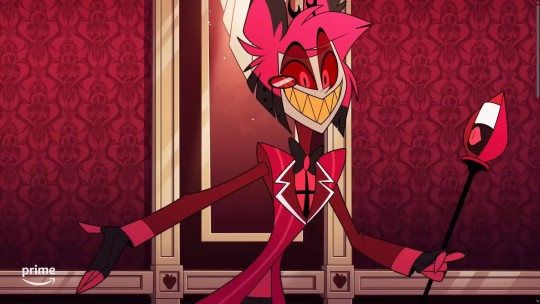
“Radio Killed the Video Star”: Vox effectively plays heel for Alastor this episode as we continue that first impression of the Radio Demon. We spend a good time showing off the former’s power and how far his roots have spread throughout Hell’s society, only for Alastor to effortlessly trounce him and steal from his audience, despite being gone for so long and his position in Hell less stable. This indicates that Alastor does still have pull, but at the same time that his position in the hierarchy of Hell is being contested due to the length of his absence. He deals with it easily here, but we’ll see in subsequent episodes that things aren’t as smooth as they first seem.

“Scrambled Eggs”: In terms of the eggs, there’s not much to talk about. He begrudgingly accepts Vaggie’s request to get rid of them “humanely,” but brings them back to the hotel after they prove to be useful spies.
More importantly, we get our first small hint that Alastor’s ego can be bruised when Carmilla doesn’t humor him during the meeting between Overlords. Now, I actually disagree with a lot of the takes on this episode in that I think it indicates that at least some of Alastor’s views and need to prove himself as a powerful Overlord are the result of self-delusion. Yes, he does need to reestablish himself as a person not to be messed with after being gone for so long, but I think it isn’t as bad as some are making it out to be, which makes his behavior in later episodes more strange and excessive if anything.

Carmilla, who mind you is a busy and stressed woman trying to hide the fact that she’s successfully murdered an angel, hits his ego by not caring where he’s been (something he wouldn’t have revealed in the first place), but she also welcomes him back, which is more than you could say to Velvette and by extension the Vees. And minutes before that, Zestial, who’s probably the highest on their totem pole, does go out of his way to meet with Alastor and inquire about where he’s been. Alastor himself gets over the slight pretty quickly and has no issue contributing to the meeting. Overall, he isn’t necessarily terrifying other overlords, but he still has an established place with them and they do seem to get along well enough. He’s “part of the group” unlike the Vees, who are treated more like upstart outsiders.
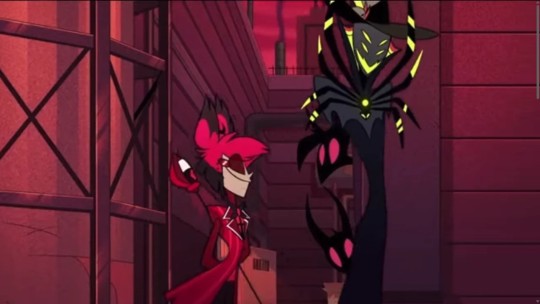
I also want to point out that despite Zestial likely outranking Alastor in power, they seem to be alright with each other. Alastor is cordial and does not demonstrate a desire to antagonize him like he does Lucifer in the next episode. Speaking of which…
“Dad Beat Dad”: This episode gives us a lot to chew on and is the first major indicator that Alastor’s issues go beyond wanting to be the center of the room. From the very moment Lucifer walks into the hotel*, his eye is twitching and he is visibly pissed. Lucifer undermining him (notably contrasting Zestial, who is polite despite his power) doesn’t help and makes Alastor let loose his first swear in the entire show. Being the petty bitch he is, Alastor, knowing he can’t intimidate Lucifer in any way, immediately goes for his weak point–Charlie–and plays up the role of a caretaker for her and the hotel. It’s a low blow, but it also feels like a defense–he’s signaling to Lucifer that this is his hotel, that things are taken care of already, and that they do not need his assistance, even though they ultimately do in order to get a meeting with Heaven.
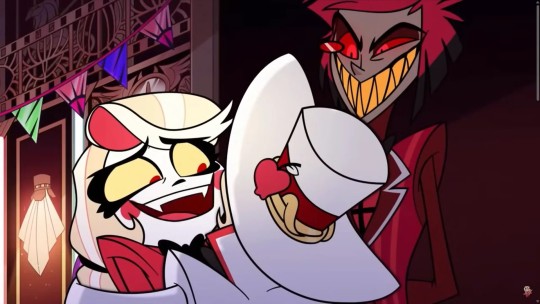
But then things get more complicated with the appearance of Mimzy, who, to the surprise of several characters due to his solitary nature, was friends with Alastor all the way back when they were alive, and she carries a load of implications with her. She’s the only crack so far at what a “human” Alastor is like–apparently he’s a heavyweight drinker, a good dancer, and most notably, in Mimzy’s words, a sweet man who "becomes a kitten" when he's drunk. This is a huge departure from the unflappable, egotistical Radio Demon we’ve known up to now, and I think it’s a purposeful choice that we’re hearing this information but not shown it like his early days in Hell just prior. It’s simultaneously left to the imagination but difficult to do so because it contrasts so heavily with everything that has been shown to us beforehand. Another thing is that Mimzy is sure that Alastor will clean up her mess–and apparently this isn’t the first time he has, if Husk is anything to go by. So many people seem to miss this, but Alastor, who hates being tied down or disrespected, has been allowing Mimzy to leech off of him, presumably due to their past friendship making him turn a blind eye.
Alastor is on edge for this entire episode and is already unusually snappy when Husk addresses Mimzy, and pushing the button that was his contract is what sends him over the edge. His temper exploding is a direct result of his feeling that his control over both the hotel (via Lucifer) and his personal life (via Husk’s “doubt” that he can handle everything and that his reputation is what it used to be, plus the reminder of his deal) is being taken away from him. Alastor’s threat to Husk, which seems to not be his usual behavior if Husk’s willingness to show concern and talk back in the first place is anything to go by, is an attempt to remind both of them that he holds the cards, that he’s a powerful Overlord that is not to be trifled with, and he explicitly says as much when he goes out to deal with what Mimzy’s dragged in.

It’s only after he lets his anger out on the mobsters and “proves himself” that he visibly calms down and makes the logical decision to tell Mimzy to leave with a serious attitude, and also doesn’t antagonize anyone for the rest of the episode. It seems like despite his fury earlier, he was listening to Husk, who’s rightfully smug about it. He’s even present when Charlie declares her desire to protect her people, and his smile seems just a tad bit more genuine.

*Note: it’s not impossible that Alastor has some sort of personal grudge against Lucifer which caused his hate-on-first-sight, depending on the circumstances of his disappearance and contract (i.e. if it’s with Lilith).
“Hello Rosie!”: As opposed to Dad Beat Dad, Hello Rosie is arguably where we see Alastor at his most in-his-element. He gives off a lot of conflicting vibes at the beginning, from mocking Charlie’s distress to, in a shockingly honest moment, lecturing her about the importance of a smile to portray strength, a card we’d only been shown due to comments outside of the show. He smugly holds his knowledge over Charlie’s head but is visibly impatient to have her make a blank check of a deal with him, solid enough to benefit him but vague enough so that Charlie won’t feel immediately threatened. He’s clearly been waiting for an opportunity like this since the events of the pilot.
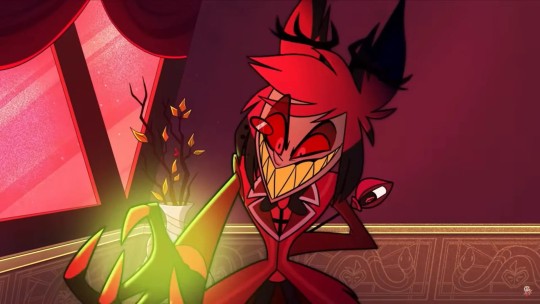
After that, he puts back on his gentleman’s demeanor and introduces Charlie to Rosie, and from here on he’s arguably at his most comfortable in the entire show. He’s relaxed around Rosie and is actually willing to ask for her help (something I can’t see him doing with any other character), casually complains about Susan, is encouraging to and praises Charlie even behind her back, and most notably, gives her his radio cane unprompted. More on that later. He also mentioned wanting to guide Charlie to Rosie specifically, implying that he was being genuine about wanting to act as a mentor to her, though his intentions are probably self-beneficial.

“The Show Must Go On”: The finale is arguably the most revealing episode on what Alastor’s inner world is like, as we see him unmasked several times. For one, his private admission to Niffty, the closest thing he has to a friend within the hotel, that he’s enjoyed watching the other residents connect to each other. This is in direct opposition to his initial (stated) reason for helping the hotel in that he wanted to watch them all fail, and yet he seems content with his initial assumptions being proven wrong. There’s no malice or sarcasm in this moment, he’s relaxed and talking to someone he relatively trusts.

And so he goes into the battle swinging and confident. Then, of course, Adam.
I want to bring up something before we keep going. Yes, fighting Adam without angelic weaponry was a needless risk. Yes, Alastor fell victim to the very sloppiness and arrogance he accused Adam of, and it’s thematically appropriate that he was the only one to lose his battle in that he was fighting for his own ego more than “love.” But also, people seem to forget that Alastor is the only demon in the entire show with a precedent for permakilling without an explicit reliance on angelic weaponry, as the Overlords he toppled in his original rampage seem to have never returned. He’s egotistical, but not stupid. He may have genuinely believed that he had the means to kill Adam himself but didn’t get the chance/couldn’t due to his contract or absence possibly weakening him. But that's speculation for another day.
So, he has to retreat before Adam double-taps his ass and is too injured to return until after the extermination. He makes a grand exit, but not before grabbing the broken pieces of his radio cane. The one he allowed Charlie to use just an episode prior, and presumably is a conduit for his powers, and he grabs it while a murderous angel is inches away from wiping him off the face of Hell.
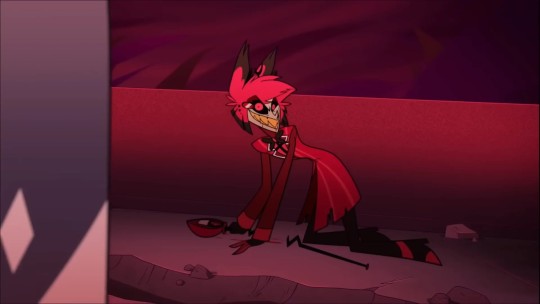
His portion of “Finale” is the first time we see him singing alone and not playing off someone in a duet. It’s obvious that he’s trying to keep his composure, still speaking to himself in his artificial transatlantic accent (which we now know for a fact he doesn't need to do, seeing as he finally broke character when Adam wrecked his cane) and reassuring himself that he’ll come out on top next time. But here his front shatters and we openly see what the show has been hinting he is for the first time: a deeply paranoid, desperate, and unstable man.
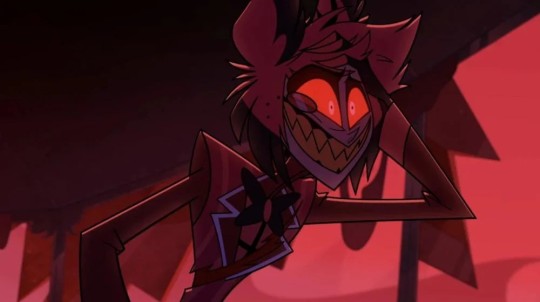
Essentially the worst-case scenario has happened: after a season of interfering with every attempt to capture him on camera, Vox has footage of him at his lowest point for all of Hell to see, and he’ll have “died” a martyr, a weakling, and still in the chains of an unwanted contract. For Alastor, who is so deeply afraid of showing any sign of vulnerability, who wants to be seen as a monstrous Overlord, it’s understandable that this humiliation is enough to send him into a mental spiral and recant any fondness for the hotel in favor of accomplishing his own goals. Worse yet, when we next see him he gives zero indication of any of this even when Charlie and company are simply glad that he's alive, which leaves us to wonder: has he been like this behind the smile from the very beginning?
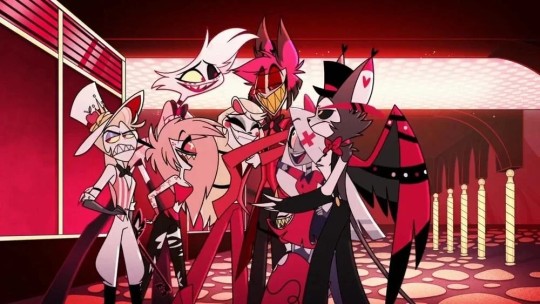
___
Part 2: Closing Thoughts and Future Speculation
With everything we’ve taken note of above, we can start to piece together a picture of who this guy is, and what the writers are going to do with him.
Alastor is sentimental. It’s not just his attachment to older technology or his love for being the center of everyone's attention. He likes being around people, he has friends, one of which he continuously indulged despite her using him multiple times, and he ultimately was starting to enjoy his time at the hotel before his defeat spooked him. Despite him using her, the fact that he was even willing to let Charlie use his cane (and note that he takes it from her as soon as she’s given a substitute, so that is a significant gesture for him) is an implicit display of trust whose implications don’t become apparent until the finale.

But this is paired with deep insecurity. Alastor, despite being one of the most powerful people in the Pride Ring, has a crippling fear of being seen as vulnerable or “lesser” by others. There could be multiple overlapping reasons for this: the general climate of Hell, whatever happened to him seven years ago, his experiences as a mixed-race human living in Prohibition-era Louisiana, his original death, a natural predisposition, etc.
Regardless, this anxiety of his is so overwhelming that, when paired with the ever-present stress of not owning his own soul, it’s driving him insane. He made a splash in Hell upon entry and now he’s desperately trying to reinvoke that in order to defend himself both physically and mentally. He’s the gifted kid who’s slowly going nuts trying to keep up an impossible momentum as they grow older. He’s an ex-human denying his humanity because he doesn’t want to feel human. Everyone’s out to get him, and anyone who could be an enemy is an enemy unless he has total control over them via a contract, power, or the reassurance of years of close friendship. It’s why he’s cordial to Zestial but takes Carmilla (who wasn't even trying to spite him) and Lucifer’s comments personally, in the same way someone with low self-esteem might want to lash out against an authority figure who they feel is looking down on them.

Worse yet, he can’t/won’t let these feelings out and is bottling them up so that no one will know he feels this way (note how quickly he was able to relax in Dad Beat Dad when he was given an outlet for his stress), because that’s a sign of weakness too. It’s honestly kind of frightening that in his final scene he gives zero indication of being injured or of just having had a meltdown. By all outside accounts, he’s his usual chipper self, and no one at the hotel save for maybe Husk, who can’t say anything Alastor doesn’t want him to, would realize anything is amiss. The reason his part of “Finale” is chilling isn’t just because of the implications that he will become an antagonist in the future–it’s that his mental state is so poor that he is no longer acting rationally, which makes him unpredictable in the worst possible way.

I think Alastor’s character arc isn’t going to be redemption by way of going to Heaven, I don't think that place is his style anyway, but rather redemption of his own self-image. I don’t think the writers would make what is arguably the most popular and well-developed character in the show just to say that he’s hopelessly evil and simply end it at that. We’ve been exposed to multiple facets of his character, and while his deeds and probably his intentions are sinister, his underlying motivation for it all seems to be “freedom,” which decidedly isn’t (unless your name is Eren Jaeger).
I do believe that he’ll have his villain moment where he indulges in his worst impulses, but that ultimately it won’t do anything to fulfill him, because as we see in the official comics before the release of the show (which may no longer be canon but still give a viable “baseline” for the characters), when his desire to be feared and respected is granted, it only isolates him. Like the others, he’ll have to hit rock bottom before he can climb back up.

Pentious, who was successfully redeemed, needed to understand that people weren’t out to get him, which allowed him to make the decision to put his friends before himself and trigger his selfless sacrifice. Angel, who’s well on his way to redemption, needed to realize he wasn’t alone and could rely on others, and his confidence and self-love has grown enormously since then. I think these are both lessons Alastor will need to learn eventually as well. He’s the manager of the hotel, but also undoubtedly a patient. He’s hungry for freedom, but only when he learns these lessons will he be truly free.
Or maybe I’m thinking too much into it idk lmaooooo
#hazbin hotel#hazbin theory#hazbin hotel theory#hazbin analysis#zestial morde#carmilla carmine#lucifer morningstar#hazbin lucifer#charlie morningstar#hazbin hotel rosie#hazbin alastor#hazbin hotel alastor#alastor#thank god i finally released this now i never have to think about this show again#that tragic feeling when the tumblr sexyman bait is the best character in the show#alastor does not have a blanket hatred for everyone who's more powerful than he is#if he did then he'd despise charlie too and genuinely doesn't seem to#rather it's towards ANYONE whether stronger or weaker than him who refuse to acknowledge him#oooooooh this boy's got a complex but he's a VivsiePop character so it's par for the course#but anyway some of the takes people have made on him are abysmal to me so i wrote my first tumblr post in a decade
366 notes
·
View notes
Text
Kou's perception of Mitsuba, and how it changes, is fascinating to me.
(Quick note: I’ll be calling the human ‘Sousuke’ and the supernatural ‘Mitsuba’ to make it less confusing)
Let’s rewind to Mitsuba’s introduction in Hell of Mirrors: Kou leaped at the idea that Sousuke was back. Even after Tsukasa told him this isn’t the same person he used to know, merely an "artificial ghost with part of Sousuke's soul", Kou subconsciously rejected the idea.
Mitsuba’s existence brought his grief back full force, and while he could sense that Sousuke’s memory doesn’t perfectly match reality, logic was never his strongest motivator in hell of mirrors, he is so full of hope and desperation: He wants Mitsuba to be Sousuke so bad.
He can’t let go of the past, he is not seeing Mitsuba, just shadows of Sousuke.
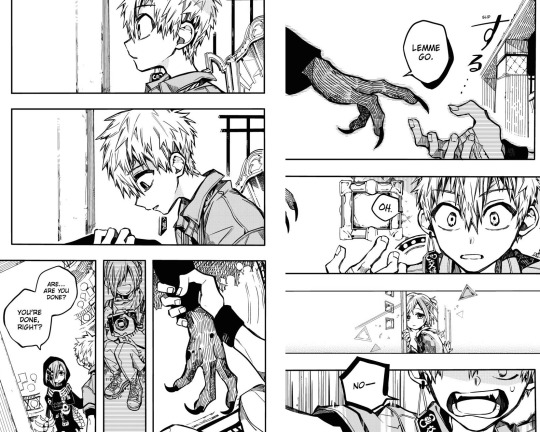
Kou wasn’t able to tell this is not his old friend, simply perceiving Mitsuba as an amnesic Sousuke.
Kou wants Mitsuba to 'remember' him when we know from Mitsuba's empty mirror that he has no life to remember. Kou calls him what he had called Sousuke and gives him Sousuke’s photos, visibly desperate to get his friend back.
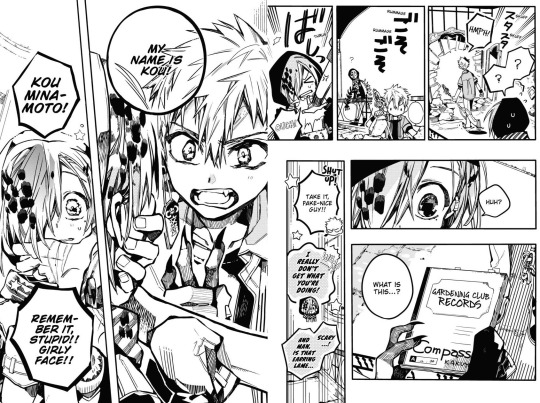
Even when they get out, Kou did not allow himself to face reality, talking about Mitsuba as if he was Sousuke, pushing what Tsukasa had said away.
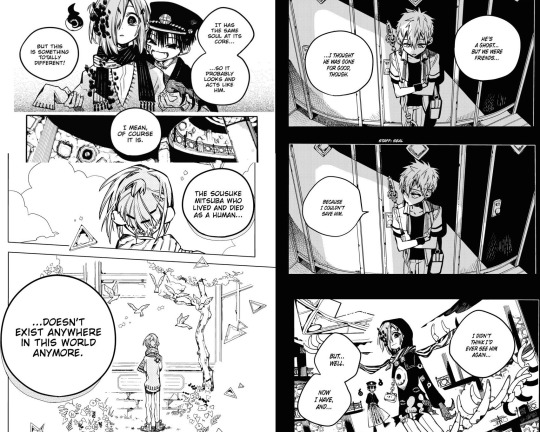
“I thought he was gone for good” “I didn’t think I’ll ever see him again” “Because I couldn’t save him” Is all about Sousuke, which, as Tsukasa explained, “Sousuke doesn’t exist anywhere in this world anymore”
Kou only starts to realize what he has been doing and face reality in picture perfect, when Mitsuba shows him Sousuke’s life on the windows, calling Kou out for only focusing on his dead friend, ignoring Mitsuba, and using him for his own selfish reasons.
Kou is reminded of his trauma when Mitsuba breaks the window with Sousuke’s memories in it, but it does serve as an efficient wake up call.
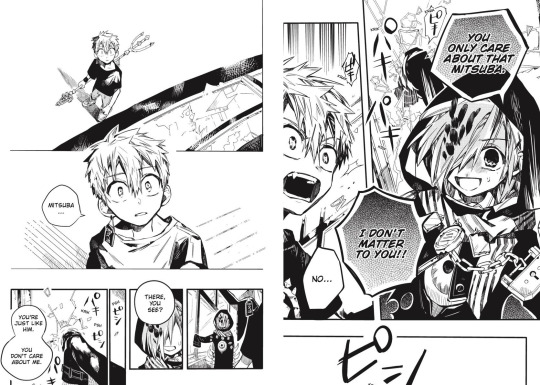
Kou actually looks at Mitsuba here. He is dazed and shocked but he pays attention to what Mitsuba is saying: he is able to sees him as his own person.

Mitsuba is confident no one cares about him, so after venting, completely breaking this world's facade, he sucks up his tears and goes back to his human form, offering Kou his dreams.
This time Sousuke’s image isn’t overwhelming. Kou doesn’t want to believe in this fake world now that he can see through it: Now that he can see Mitsuba.
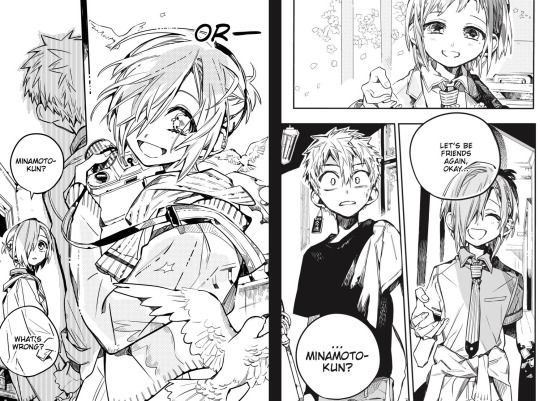
He understands this is his own wish, not Mitsuba’s.
He can see that this lie is hurting Mitsuba.

Kou understands that there is truth to Mitsuba’s words. During all the fun times they spent together, he had been picturing Sousuke by his side, he wanted to have Sousuke back so badly that he never considered Mitsuba’s feelings, or how his wish to replace him would be hurtful.
Kou is a selfish person full of genuine kindness: He still wishes Mitsuba was Sousuke and he feels guilt for ignoring Mitsuba.
“You can’t find happiness in a fake world” is a message to both Mitsuba and himself. Once Kou snaps out of his dream, he realizes it would only lead to ruin and tries to drag Mitsuba out of his own delusions, and while he has some points, he doesn’t understand that promising a better reality, giving him hope, is cruel.
Kou genuinely wants to understand Mitsuba, so he hears him out, and pays full attention to his distress.
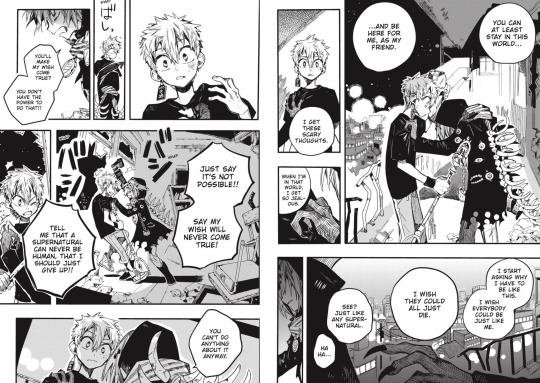
There is still the solid weight of his failure with Sousuke in Mitsuba’s very essence, but despite them looking the same and being very tied together, Kou is determined to focus on Mitsuba, he doesn’t want to do the same mistake again.
I won’t go in depth on Kou’s lack of care about his own life in this analysis, but I think it is worth noticing this offer was for Mitsuba, not Sousuke, and Mitsuba could see that.
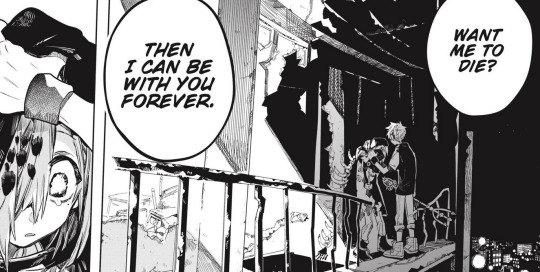
Mitsuba doesn't believe Kou can make him human, but he understands that he is serious, and that Kou will try.
He gets the feeling that maybe, hopefully, Kou cares about him too, not just Sousuke, so it freaks him out that his possible friend throws himself out of the fucking building.
The last thing Kou wants is to hurt him, so he apologizes for being reckless and trying to sort out his own feelings without considering how Mitsuba would feel.
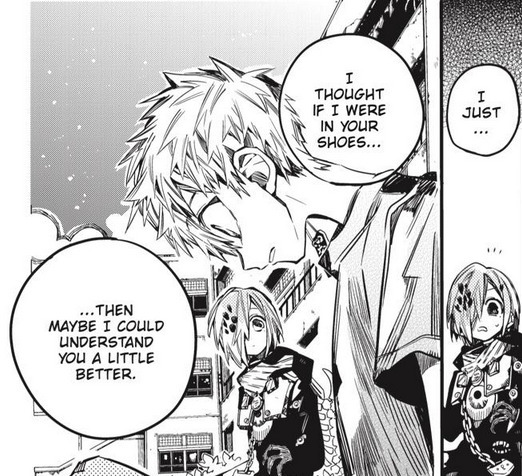
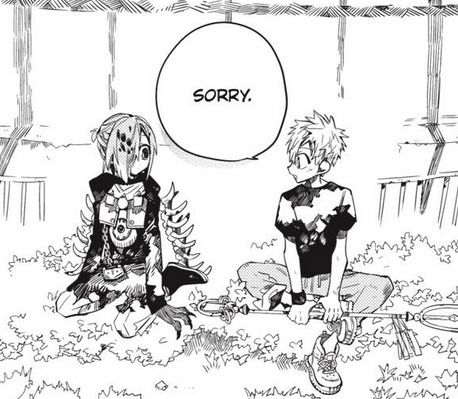
Despite this determination to be closer to Mitsuba, he subconsciously puts a distance between himself and the supernatural. He accidentally keeps ignoring him.
Remember this:

It’s about Kou’s wish, but it shows one of Mitsuba's own wishes, one weaker than his burning desire to be human, but no less real: The wish for friends.
Friends are one of the reasons he went along with faking to be Sousuke, friends are one of the many reasons he wants to be human in the first place.
But unfortunately, this is a wish he shares with Sousuke, so Kou blocked it out, not wanting to overlap the two, even if wanting to be friends is a part of Mitsuba too.
It’s complicated.
Being friends meant so much for Sousuke, and Kou doesn’t want to be reminded of him.
Kou understands seeing Mitsuba as Sousuke is an insecurity of Mitsuba and truly believes that the supernatural deserves better, he should be his own person instead of a shadow of Sousuke. Kou recognizes this difficulty separating the two is his issue, not Mitsuba's, so he is determined to make sure it doesn't become a problem again.
This need to separate the two makes it so he can’t see Mitsuba as a friend, or if he does, he can’t voice it. He has never called Mitsuba a friend unless he was thinking of Sousuke or mistaking him for Sousuke, whose friendship he treasures. Even when Mitsuba had expressed he want Kou to stay in this world as his friend, the wish didn't register, and Kou focused instead on the far less achievable, but completely detached from Sousuke, dream of turning him into a human.
Mitsuba’s dream is important to Kou, and Mitsuba noticed that, since his vent was a moment were he had Kou full attention on him instead of Sousuke, so Mitsuba eventually used his dream to distract Kou from Nene’s lifespan and their dilemma in Mei’s world.

Unfortunately, this is, at its core, just a distraction: Mitsuba may believe in Kou’s determination, but he doesn’t believe Kou has the power to grant his wish, he isn’t expecting Kou to find a solution, and he never pressures Kou about it after, he only said this because he doesn’t like to see Kou in distress, it makes him uncomfortable, and so he needs him to snap out of it.
Mitsuba has no idea how huge this is for Kou, how important it feels, cause Kou feels as if no one had ever expected anything from him before.
Even when Hanako expected him to save Nene, Kou had no idea so much trust was put on him, because Hanako only told him this:

And Kou was frozen in time, unable to hear a thing, when Hanako added this:

So in Kou’s point of view, Mitsuba is the only one that expects something from him, the only one that depends on him. (which is diferent from people depending on his role: like his siblings needing a housekeeper)
Kou talks big but in the end, he is just an overwhelmed 14 year old: while he is determined to make Mitsuba’s dream come true and fully separate him from Sousuke, he has no way to help him, and it is hard for him to not see Mitsuba as Sousuke. It’s incredibly hard.
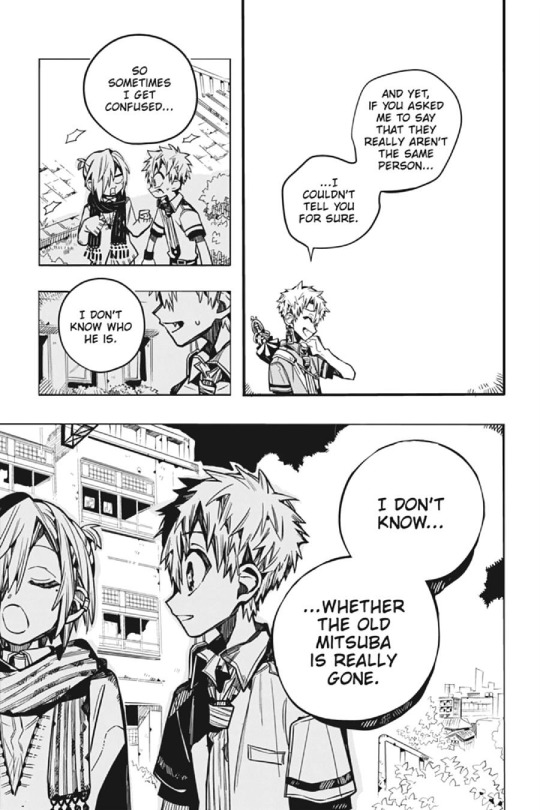
It may have been presented in a comedic manner, but we know this haunts him all the way to his dreams.
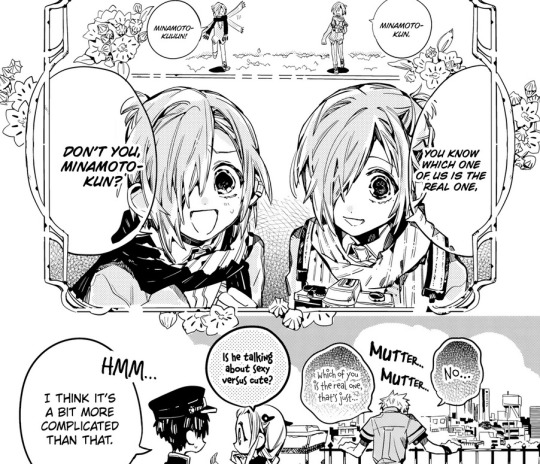
Add in all the romantic undertones of his interactions with both Mitsuba and Sousuke, and Kou really has a big crisis.
He only fully comes to terms that Sousuke is gone when he visits his mom and sees first hand the impact of his death.
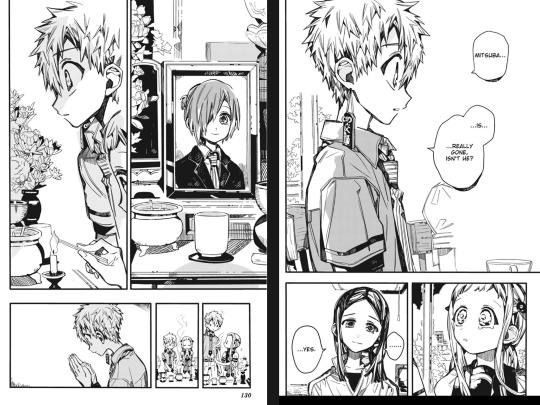
He processed and mourned Sousuke's death, he can truly separate them now, but things are still far from simple.
What exactly is his relationship with Mitsuba? It isn’t as easy to understand as his relationship with Sousuke.
Let’s see how his wishes manifest to illustrate it. This is his wish with Sousuke:
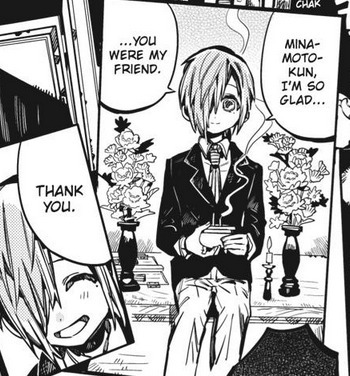
It's the wish to have been a good friend to Sousuke while he was alive. Depending on where you read, the translations may be ‘you were my friend’ or you ‘are my friend’ but regardless, it has Sousuke wearing his death clothes and thanking Kou, which shows that Kou has moved on. He has accepted his death, no longer wishing for Sousuke to come back to life.
His wish with Mitsuba may start simple enough: Kou wants to be missed, to be wanted.
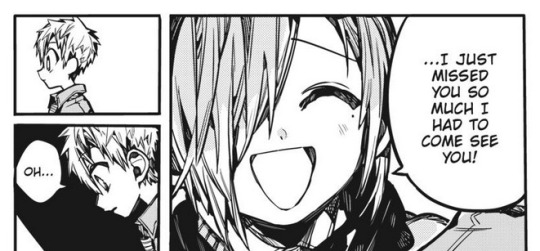
But grows out of control very quickly.
It’s strange. Dangerous.
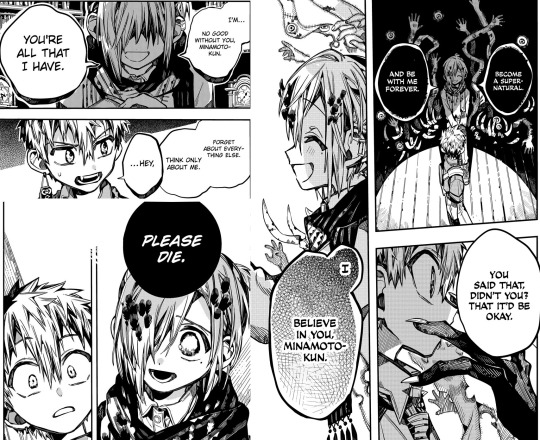
It’s important that when the Fake shows up in the red house he is a supernatural, not a human like Mitsuba wishes to be. The fake also wants Kou to fulfill his promise from picture perfect and die so they can be together, which is something Mitsuba rejected, angry with Kou for his reckless behavior.
This wish to stay by his side forever is purely Kou, though it's not as simple as Kou wanting to die: Keep in mind that many of the house wishes are merely things Kou subconsciously wants because it would give him an easy answer to a dilemma he is being troubled by: Like when the house materialized an evil Hanako telling him to “exorcise me before I kill everyone” because all his problems would have been easier to solve if the world was more black and white.
If dying, ending it all, really was a deep wish of his the house would have shown him an easy way to die: For better or worst, the house is very straight to the point with its temptations, when Kou wished for a legendary weapon that would ‘save senpai in a flash’ the house gave him exactly what he asked for, when he got hungry it showed him food, so if he seeked death itself, even if subconsciously, the house would offer him a noose or a drop as high as a school building, not something so tied to the idea of being wanted, to Mitsuba trusting and believing in Kou.
Kou has very little self-worth and sees his own life as a disposable tool for others, but I do not believe being willing to die and wanting to die are the same. He mostly wants an answer about what to do with Mitsuba, he wants to be the one with the solution to his problems more than he wants to make Mitsuba human, and the only solution he can come up with is to become a supernatural, so the red house gave him exactly what he wants: a solution of his own making.
Kou is very self-centered, the Fake may be twisted, but Kou had always accidentally distorted his relationship with Mitsuba, the unease he felt facing the fake is likely because it isn’t what he expected to see, but it isn’t alien either, it’s similar to things Kou has thought before:
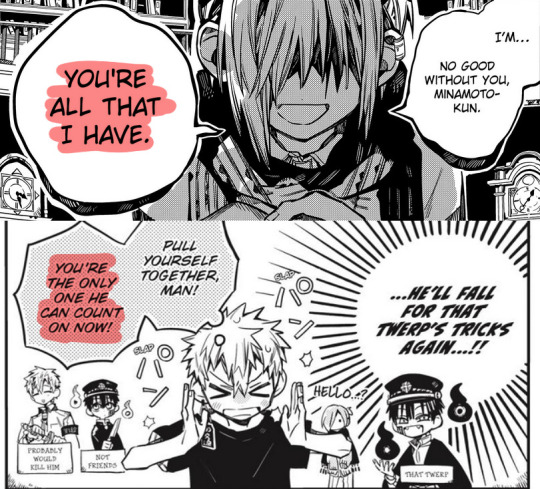
Now, Kou doesn’t want Mitsuba to be helpless, to consume his life, he have no malicious intentions whatsoever, but he does want to be needed. Kou is desperate to be needed.
He feels like he is never seen as reliable: He had bonding moments with Nene on many occasions but she has Hanako, whose actions are morally questionable at times but he does get results, unlike Kou. Teru loves him but kept him in the dark about the exorcist world for his whole life, Tiara loves him but Kou seems to be under the impression her favorite bro is clearly Teru, and anyone else wouldn’t pick him as their first choice.
In contrast, Mitsuba is very attached to him, Mitsuba has a wish that he had asked Kou to grant him, and Kou had attached himself to Mitsuba just as much as he has grown attached to the idea that Mitsuba needs him.
Kou’s wish to be with Mitsuba and his deep wish to be needed are interconnected, Kou wants so so much to help him, to not be a disappointment again, that he became obsessed. Ironically, while Kou wants to be trusted, he doesn’t trust himself, and this determination to grant his wish blinds Kou from bonding and granting Mitsuba's wish for friends. Kou does have good intentions but he is doing what he wants, he is not paying attention to Mitsuba.
Kou doesn’t want Mitsuba to worry, Kou wants to help, and he can’t see his lack of self preservation hit Mitsuba too. I personally think Kou is aware his selflessness is inherently selfish but he hates that part of himself, because he rejected all his wishes in the red house but was able to admit to himself later they are his wishes.
He seem to acknowladge this but still reject it, cause he keeps doing the same mistakes: He may have apologized for jumping in picture perfect but he keeps missing Mitsuba’s intentions.
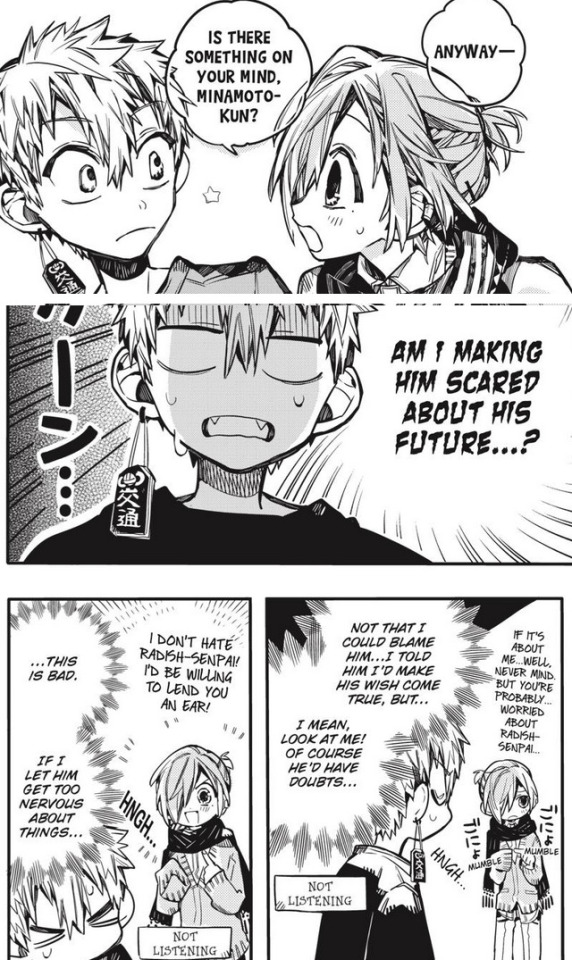
He is at his most selfish with Mitsuba and yet, I have no doubts he genuinely cares about him.
When he does see Mitsuba again, he is happy he is ‘good’ and he has both a heavy romantic energy and a noticeable distance. In hindsight, I’m not surprised he called him an acquaintance.
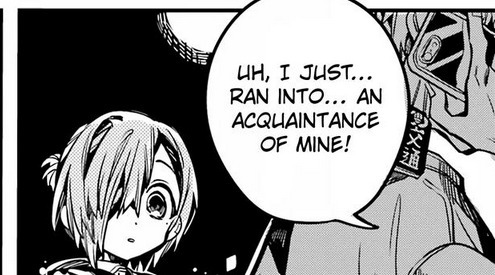
Kou likes him but he isn’t sure if is because of Mitsuba or because Mitsuba reminds him of Sousuke, so Kou had put a mental block on the idea of them being friends. Mitsuba very existence was born out of his failure with Sousuke, and have a big tie with Kou’s self worth. Any romantic feelings he has are being suppressed, and yet they do have a connection outside Sousuke. Kou is so focused on not disappointing Mitsuba he sabotages a lot of chances of connecting with him.
So what are they? It’s not as simple as ‘not quite friends and not quite lovers’, they are deeply affected by each other but know so little of the other they are basically strangers. They put their wishes on each other (”I want friends” “I want to be needed”) and yet misread what they are expected to give. They want connection and are afraid of not being as important to the other as the other is for them: They are a loving and tragic mess.
I am not surprised Kou had a breakdown when Mitsuba told him to exorcise him.
At this point, Kou is able to see Mitsuba as his own person/monster, so I feel like the request to be exorcised doesn’t make him remember Sousuke’s death, but it does bring back Severance trauma: We haven’t seen a Sousuke flashback in ages, but we got plenty of little panels of Mitsuba in the severance from Kou’s pov.
Outside the distress of Mitsuba wanting to die after Kou just got him back, it’s important that Kou focuses on how he needs to eat to survive after the severance, and instead of being disgusted as Mitsuba expected, Kou takes it as a personal attack, as a declaration Mitsuba also has Tsukasa to rely on.
Kou doesn’t care that Mitsuba is a monster, it was one of the main things he used to differentiate him from Sousuke, is old news, but he does care that Mitsuba still wants to be human but have gave up on ever being one. By doing so, Mitsuba indirectly admits that he doesn’t believe Kou can grant his wish, which is a promise that Kou had put a lot of his self-worth in, so it feels like Mitsuba doesn’t need Kou.
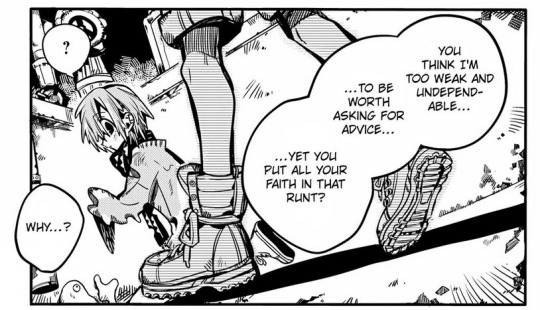
The only thing Mitsuba seems to need Kou for is to exorcise him.
Kou needs to handle both the realization Mitsuba wants to die and that he doesn’t believe in him, that’s more than enough to break him. Add in all the repressed feeling he have, both of friendship and romance, and dear lord, please help this kid.
These two have so many communication problems I hope they talk in the next chapter.
#tbhk#minamoto kou#mitsuba sousuke#toilet bound hanako kun#jshk#jibaku shounen hanako kun#I still have so much to talk about it's so wild to do analysis on a main character#cause Kou give me TOO MUCH to work with#this is my longest post yet and I have barely scratched the surface send help#kou minamoto#character analysis#long post#I love kou so much is insane#mitsukou
961 notes
·
View notes
Text
Suguru Geto - JJK character analysis (near complete?)
“I gave everything I had, and it failed. It all crashed in front of me. And nobody did anything— not before me— not now. I’m seeing something nobody else sees. I’m sitting in these shadows and nobody cares about me. And here Gojo is, not doing a thing— and they praise him.” - my interpretation of Geto’s thought processes post Riko Amane’s assassination.
Crying about Geto because he went through so much. Geto was compassionate and idealistic before he defected. After such intense, prolonged trauma caused by the darkness of humans, and after growing disillusioned towards the world due to how unhelpful jujutsu society was— Geto felt utterly confused, resentful, and abandoned. The very system that was supposed to represent goodness (Jujutsu Society) simply prolonged the cycle of pain and suffering. It failed everyone— it failed him. Everything he’d believed was a shattered mirror, reflecting the cracks and flaws of humanity— and Geto saw that. Jujutsu Society praised Gojo for his innate talent, whilst neglecting the cracks in its system and the world, and neglecting Geto. In Geto’s turmoil, Geto was overcome by disenchantment— losing his faith and shedding his past sense of self— his good nature replaced with bitterness towards Gojo, simultaneously accompanied with a developed, narrow perspective on normal humans. (As we see with “Are you the strongest because you’re Satoru Gojo, or are you Satoru Gojo because you’re the strongest?” — Geto brings up the age old question of nature Vs nurture. He’s essentially asking Gojo if his power is the reason for his success, or if his power shaped his identity. Who is Gojo? Did he get any choice in defining himself? —He didn’t. Gojo’s whole personality is based off of his power, which determined how he was treated— the Strongest, seen as a functioning tool. —And regarding Gojo’s power: What was once a deep admiration towards Gojo, turned into resentment and envy from Geto’s end, as Geto realized Gojo wasn’t changing the corrupt systems, nor did Geto have the luxury of power to have made a difference. Geto felt spurned, and also believed normal people were unworthy of ruling, and the only way to save the world from its already unjust systems was to overthrow everything and use power to rule. After all, power is all that matters in terms out how you can change the world, which is your worth in the world— and Geto wanted that. He wanted power. He wanted to be worthy the way Gojo was— he was hurting. Maybe if he had Gojo’s level of power, he wouldn’t be in this much pain. Maybe he would’ve been able to stop other people from being evil and actually have had footing in this world. Maybe people would be listening to him, appreciating him. —Or maybe, Jujutsu Society was just a phony, after all. And normal humans were useless to change anything— all they did, in Geto’s mind, was feed into the evil nature of the world. …Geto became resentful, callous, cold, evil because of the wrongdoings inflicted on him, which resulted in his misinformed beliefs about humans and his behavior run wild with blind spite. He truly believed that the pain he inflicted on humans was justified, and he reveled in it because he had been hurt so deeply and saw it as reparations, even.
Do I believe what Geto did was okay? Absolutely not. He had much too rigid a way of seeing humans— as all bad— and that was a fallacy. But he was only 17 when he faced such confusing, extreme, difficult circumstances, and it distorted his worldview. I can’t blame him. He WAS good. But being around constant darkness wore him down, thus he descended into a callous man devoid of empathy. His actions after defecting are deplorable and not okay, however, he truly deserves compassion too. Many others, had they been in his situation, would’ve ended up horribly warped too.
How could Geto have done better, so as not to become the evil, rigid and disillusioned, cold and harmful, person he became? This is an important question. I’m still figuring it out myself. This analysis is to be continued. For now I’d say that he was unable to empathize with humans beyond his own pain and suffering, and it’s a cautionary tale about how wrapped up we can get in our own trauma and suffering— which leads us to being incapable of seeing and understanding things beyond our own individual pain, which leads us to inflicting undue injustice into others. It’s crucial that we take the time to understand the depth and complexity of humanity. The inherent value in humans.
I’m sorry, Geto. For all you went through, and for ever judging you without the fuller scope of understanding. You deserved better.
#tragic#geto analysis#Suguru Geto#OUCH#jjk#Geto Suguru#jujutsu kaisen#jujutsu kaisen analysis#JJK analysis#satosugu#Suguru#Geto#JJK thoughts#JJK angst#JJK villains#jujutsu kaisen thoughts#jujutsu kaisen philosophy#JJK philosophy#philosophy#extremism#jjk imagines#jjk fanfiction#jjk fanfic#jjk fic
108 notes
·
View notes
Text
The Incest End is Not The Bad End, Part 3: The Only End I Know For Real
Alt title: We're roleplaying the endings, not choosing them.
I've focused a lot before on how sickly sweet the chemistry between Ashley and Andrew is and how unproblematic their relationship would actually be under different circumstances, mostly societal ones. I mostly did so to counter the idea that the incest end was primarily a bad end and bring up the assertion that it was the one with the most hope. In doing so, I basically interpreted all of the text within the game in a very positive light, giving off the impression that I think it'll be all sunshine and roses. The reality couldn't be further from the truth? While I think it's the end with the most hope, I ALSO think it'll be incredibly difficult for everyone involved.
As a matter of fact, I think the Questionable end will be the most difficult one to navigate through for Ashley herself.
"But wait," you say, alarm bells ringing in your head, "doesn't she literally fucking die in the Decay ending?"
And I don't think it's that obvious.
First off, why do I think the Questionable end will be difficult to navigate through? After all, Andrew is calm, collected, and Ashley is just a little bit nervous about how he's changing. She also has that ultimate leverage over him, knowing that he's sexually attracted to her and she can use it to keep him by her side. There's little for anyone to worry about, right? Well, no. Not really. As another analyst has pointed out, in the Questionable ending, Ashley has no OTHER leverage over Andrew.
The trinket? Shown to be only situationally useful to them. The future visions don't always show danger, sometimes the demon can just troll them. Sleep? No, he no longer needs Ashley for that. A scapegoat? Not even that. In the Burial ending, he starts to take responsibility for the violence he inflicts on others and has no need to pin the blame on Ashley.
Outside of sex, Ashley is more or less useless to him now, at least in her own mind. Truthfully, Ashley is still the most important person in the world to Andrew and doesn't seem to need a reason to keep her around anymore, but Ashley doesn't realize that; it's part of why she's so confused and uncertain. Their dynamic is changing, and she doesn't like it. But in the Questionable ending, all Andrew has to do is not have sex with Ashley (easier said than done if the fanbase [myself] is any indication) and she'll have nothing left. She'll likely have no other choice but to look inward at this point, especially if Andrew doesn't give off any of the usual red flags that make her think he'd leave her.
There's a good chance at this point that their dynamic will flip entirely. Ashley will be the one who needs comfort, and Andrew shows every indication of being emotionally stable enough to provide it. We'll see some Real Mental Illness instead of Possible To Infer But Maybe Problematic To Do So Mental Illness. Whether or not she changes for the better or worse will likely determine the ending we'll get.
…
Except probably not.
Sane vs Questionable can't be THAT different, or we'd be getting 3A, 3B, 3C, and 3D instead of 3A and 3B. And, y'know what? Now I'm gonna start reaching really hard into theory territory rather than just analysis. So, hear me out here.
Both dreams are canon no matter the ending. The only difference is whether or not Andrew sleeps or not; if he does, the vision he gets is for HIM, and Ashley only incidentally sees it. It's much more important to him than to Ashley, because Ashley doesn't get a clear vision like she did in the motel. If them fucking was actually relevant to Ashley, she likely would've seen it no matter the ending. Her reactions reflect this; at first, she appears weirded out, maybe uncomfortable. Then she finds it hilarious. She considers it as a means of manipulation, sure, but the writing is on the wall: She won't NEED to do so no matter what.
Unfortunately, due to her not being able to open both doors, she won't be able to realize this. Oops!
At this point in time it's basically impossible to ascertain what her own personal vision means. I've given my interpretation before, but I ultimately have my doubts that the specific sequence of events is all to relevant. Most weird dream metaphors are clear parallels to past events, but the dream seems to be a metaphor for what the future will hold. The most relevant part is not the ghosts, but instead how Ashley reacts to what is clearly Andrew's soul. She jokes about trapping it in the bottle, but it being as a joke more than anything is a far cry from how desperate her attempts to keep him normally seem. So what gives? What does this mean?
I think, funnily enough, the Decay ending holds the answer.
My most-distanced-from-a-literal-or-metaphorical-reading-of-the-text-but-is-relatively-easy-to-accept theory is that the choices we are given in the game aren't asking us what we want to see from them, but rather, how we see the characters and their relationship. People are distracted by the idea of choice, but the reality is that we're being asked to roleplay (this is an RPG after all) as the siblings and do what we expect them to do. This isn't about choice. This is about BEING them and DOING WHAT WE THINK THEY'D DO.
Here's what I mean.
If we interpret Ashley as having trust in Andrew and his judgment, then it makes perfect sense she'd trust him with her parents. She might be a little worried, but it's pretty clear that her overwhelming desire to keep Andrew by her side is underscored by genuine love and trust. From there, if we interpret Andrew as having genuine love for his sister and a desire to take care of her, then it becomes everyone else's problem that they can't be together; not his. In killing their parents, he comes to terms with this and self-actualizes. He's willing to take responsibility for the violence he inflicts on others and has no discomfort with dismembering them.
But if you interpret Andrew as viewing Ashley as a burden and a problem, he can't bring himself to save their parents and have a better life because he views himself as too far gone. He hates himself as much as Ashley hates herself for being unable to break free from her influence. He still feels like she's his responsibility, but the love that exists there is greatly muted and overshadowed by his sense of responsibility and a carnal, physical desire for her. Knowing this is likely part of the reason he hates himself; part of the reason he can't let go.
He, crucially, also squanders Ashley's genuine display of trust. It's HIS fault that things break apart, which is why the skull appears over his head when you accept the mom's offer. Ashley genuinely, seriously loves Andrew and wants what's best for him. She's posessive, but her care is a lot less selfish than Andrew thinks, and he can't see that because he's too blinded by his hatred and (partially sexual) frustration to see who she really is.
On the other side of things, if you view Ashley as being a primarily toxic influence that views Andrew as more of an object than anything, she doesn't trust Andrew to deal with their parents and it's HER fault that things break apart, as the skull appears over her head. She sees him as an object, as a child or toy. She sees him as Andy, not Andrew, and can't process the fact that he can change. It's very overbearingly maternalistic, and I believe this specific choice is the only one where Ashley is actually more like their mother than Andrew, eye colors be damned.
In Burial, she wants to share the vision with Andrew, and he wants to share it with her, because their feelings are genuine and mutual and they want to share the experience (because they might get two visions from it, sure, but the principle isn't that much different) But in Decay, she keeps it to herself. She doesn't trust him or his input, either because she doesn't view his feelings as important or because he either almost squandered her trust (if she was listening in), or because he was generally hostile and disincentivized her from wanting to share.
There are other examples too, like when we're allowed to control Andrew to kill the hitman. If we view him as unprepared or unwilling to kill, we empty the whole clip because he's nervous and doesn't want to do this. If we view him as prepared, calm, and in control, he kills in one clean shot without much of an issue. Washing the [REDACTED] out of the shower drain? We basically get to see if Ashley is actually all that competent at housework or not, and if we don't know the right order, neither does she.
This comes to a head in both of the endings.
In the Questionable ending, we're shown that Andrew slept through the dream. We see what he really wants and the depths of his true feelings. He has very obvious romantic feelings for Ashley, and it's not just physical desire. Ashley's very obviously obsessed with Andrew still, but the fact that he can be present in every painting shows that she ACTUALLY views him that way. She's not just seeking validation; her feelings are real, and she knows it.
Remember, this dream is SHARED. We are seeing how BOTH of them feel.
In the Sane ending, Andrew isn't present, and Ashley is never given a chance to view their relationship as anything other than platonic. We don't know how Andrew feels, and we're arguably never given a view into Ashley's true feelings either, because that would-be revelation is cut off by a vision (indicated by eyes). We're just shown what she should do, needs to do, or will do.
Because we don't view their relationship as romantic, light is never shone on the reality of their dynamic. We never see how obsessed Ashley really is (if anything, we're being misdirected by being shown the opposite), and we never see that Andrew has romantic- if buried- feelings for Ashley that can't just be passed off as carnal physical desire. But since it's still the Burial ending, the dynamic still clearly exists; the endings would be too different otherwise. We CHOSE how we see their dynamic in the basement scene.
In other words…
Without love, the truth cannot be seen.
Reader who is in the know: "…hey wait a fuckin' minute" Me: "MOVING ON"
At some point- probably early on- the Sane and Questionable endings have to converge. Andrew and Ashley will have to have the nature of their dynamic laid out for them in a way they can't deny, and the likely only difference between Sane and Questionable will be whether or not Andrew is surprised/embarrassed, or just goes "I guess that dickhead demon wasn't just tricking us after all" and then the route will proceed as normal. Whether or not they have sex will likely be determined by your choices in Chapter 3 itself rather than Chapter 2 with this in mind. Either way, I think Ashley will go through most of the chapter confused and uncertain and will be forced to develop as a person, for better or worse.
In the Decay ending, as said, we're shown that Ashley doesn't even attempt to share a vision with Andrew, so we get to see a vision where Ashley's frame of mind isn't one driven by mutual affection. In this route, we see Ashley constantly running from -something,- and given dreams are metaphors, I think it's reasonable to assume that it's showing us that Ashley is primarily motivated by a fear of Andrew. Fear of what, exactly, isn't really clear; we know for a fact that she's afraid of losing him, but she's also afraid of the violence he can inflict upon her. Either way, she runs away, we can see the demon say "hmmm how interesting," and then we get a vision of the future.
But it's important to note, that vision is a metaphor, not a literal vision of the future. It takes place in the dream world- unlike any other vision, which takes place in the real world- and there are no out-of-frame eyes in the CGs like there are in the Questionable route. Also, (albeit less convincingly), all the eyes are in the background rather than on the map themselves, like they are when we see the hitman vision. The eyes only exist in the background in the Sane vision too, further adding to the idea that they're a metaphor.
So. If it's not a literal depiction of what will happen, then what exactly is it a metaphor for? Okay. Hear me out. This is my wildest fucking theory yet.
It's a metaphor for the Burial route. Or rather, the kind of event that happened in the Burial route.
What we are being shown in the metaphor is a reconciliation of their relationship, where their true feelings are laid bare. We are put in a situation where they are forced to decide how they feel for each other once and for all. If Andrew holds all the power in the relationship but has no control or awareness of his feelings- represented by whether he was composed enough or not to unload his entire clip-, he unceremoniously kills Ashley. Without that awareness, Ashley cannot even defend herself. She has no control because she isn't dealing with someone who has any either.
(Whether he actually kills Ashley or just some abstract representation of Leyley isn't clear, but it doesn't matter much for the purpose of analysis.)
But if Andrew does have that awareness of his feelings- represented by only shooting one bullet- they can negotiate. Because Andrew is in control, Ashley is also in control, and she can make one of two choices:
She can choose to save herself (and either maintain the status quo or just fucking kill Andrew depending on how literal the vision is). With this choice, she lets her fear overtake her and discards Andrew- the cause of her fear- like trash. He is an object that only exists for her sake, after all, and she can discard him just as easily as he seemed like her could discard her during the strangulation scene.
She can choose to trust and accept Andrew. And given a heart appears over her head, she can choose to love him, and overcome her fear, even at the cost of either her life or their prior dynamic (once more, depending on how literal it is).
Decay is asking us if we think Ashley is primarily motivated by selfish fear or genuine selfless love. But both exist either way, and their relationship must be understood and reconciled at some point; this route might honestly be their only hope for a platonic good ending, but it's going to be dismal and painful either way.
So with that in mind, why is the gun not relevant to the Burial route (yet) if it's such a strong metaphor?
Because the reconciling event WAS the basement scene.
We had to make that same choice there. Was Ashley too afraid of Andrew's interaction with her parents to let him handle it? Or did she love and trust him enough to make that choice? In choosing yes, the ball in Andrew's court. If he chooses to care for her needs, their relationship evolves. If he or Ashley refuse make that choice, that can is kicked down the road, and their relationship continues to deteriorate.
Or decay, as it may.
But in Burial, with that reconciling event having happened, the ball is in Ashley's court. With Andrew having come to terms with many of his feelings (minus his sexual desire), most of his arc is finished. There's probably still a lot of him to unpack on the Burial route, but in the Decay ending, as long as Ashley shows love for him, the final choice always falls on his shoulders. And with his final choice having been made in Burial, all that's left is Ashley's.
And what final choice will she have to make?
I don't know, I'm not a prophet.
But either way, she'll still have to make the choice of whether or not to be ruled by her fear of losing him, and desperately try to grasp for control she no longer needs, or cast aside that fear and allow for genuine, mutual love to flourish. Think about it this way: When you see a corpse, how do you react? If you don't care for the corpse or fear it, you stay away and let it decay. If the corpse belongs to someone you love, you tend to it and bury it.
And what do I think the best case scenario is? Well, I've made my opinion obvious, but I think there's one final thing I need to emphasize:
You don't claw at someone's back like a wild fucking animal if you're not really into it.
157 notes
·
View notes
Text
Some people need to understand queer coding opens character identities and relationships up to a solid queer interpretation, but that doesn’t equal “this character 100% fits my headcanon and if you disagree you’re a [REDACTED]”
From a literary analysis perspective, as long as your interpretation is reasonably evidence-based it’s valid. As this is fandom, I’d add “sincere” to that since unlike an academic setting we get bad faith actors but that’s it.
So, to have a valid “interpretation” you have to do the work in good faith, and you have to be able point at the text to support your interpretation. If you can’t, or don’t want to, that’s a headcanon, and it’s totally fine.
“But this character is a lesbian she likes a girl!” There’s more to queerness than straight and gay. You could reasonably interpret a girl who likes another girl as plenty of different things:
Lesbian
Bi
Ace/aro and something else
Straight and closeted trans
Straight and lover is closeted trans
And so on.
So when you have an interpretation, someone might tell you, “I think this other thing.” The polite way to handle this if you don’t like it is to say “that’s so cool we can see different things in the ambiguity of art”. Maybe blocking each other if you dislike their interpretation that much.
That’s of course unless you both want a debate to further refine your understanding of the text or just like to argue or whatever. Which is fine! As long as it’s not overly bitter or whatever, it’s fun to discuss.
“So how do I know which interpretation is more canon than another?”
See, that’s the thing, you can’t. Canon is kind of shaky in the first place. The canon is just what’s written that’s recognized as true/correct text, not the way to understand it (and not what the author says is true, some people take Word of God as canon because it allows the following of one concrete interpretation instead of acknowledging multiple, but strictly speaking it is not). You can only interpret the canon.
For example, 4-komas bonuses of serialized manga are usually non-canon because they are jokes and not meant to be taken seriously as a part of the story’s text. That’s what canon actually is for, originally it’s to talk about which books are genuinely part of the Bible and which are to be deemed offshoots that shouldn’t be taken as a Catholic Church-endorsed religious text.
I guess that’s what gets people confused? That there’s no actual truth to imagined worlds, only what happens in the eyes of the beholder when they interact with art?
Because that’s what it means, canon often has nothing to do with who’s “actually a lesbian” short of them saying it directly. An onscreen wedding is said to “make a couple canon” precisely because there’s only so many ways you can interpret a wedding, but all that means is that the text says they’re together at a point in time. One way I can think of having a canon sexuality would be a canonical character sheet, or an omniscient narrator saying so, but everything less is basically an interpretation.
Note that interpretation obviousness can go from “that’s a stretch but I like it”, to “you only need eyes to see it”, they’re both still interpreting. Even a character talking sexuality technically only makes canon that they’re willing to say so, but that’s when critical thinking comes in.
If you hear a character say “I’m a married lesbian” and think “they’re just confused” with no evidence, you look like an idiot. You absolutely can argue which interpretation is more valid or likely by pointing out inconsistencies, stretched evidence, or that one interpretation has a higher volume of evidence/etc. This is how you avoid relativism and “nothing the text says matters” trolls.
Occam’s Razor is another way you might be tempted to try and determine whose thesis is stronger. This technique works through figuring out which interpretation requires the least amount of assumptions (saying something arbitrary is true as a basis) but it doesn’t make anything canon, or more interesting, it’s not a concrete sign of superiority. Just means it has stronger fondations.
However… your interpretation being stronger, more popular, better worded etc. or you thinking someone else’s is immoral, stupid, etc. doesn’t give you license to be a bully, to call people names, to dox them, dig up dirt to make them look worse, and so on and so forth. Thinking you’re right and they’re wrong does not make you above basic respect, politeness, or consequences. You’re not better than everyone else.
As a child, I used to think I was always right because I was logical, and I clearly made logical sense so there was no way for there to be a logical reasoning that arrived at a different conclusion. (Newsflash: Child me was very wrong! Sometimes multiple things can be equally valid! And even if they were not equal, that didn’t give me license to deride people publicly!)
Queer coding is by its nature interpretative. Coding is the author leaving hints about their characters by using a “code”. Some hints, almost everyone in your section of fandom might have the exact same interpretation about. Some hints might be dead obvious. Some hints might leave you overjoyed. Some hints you might ignore because they make you uncomfortable.
Some people will disagree with you about how they interpret the coding, or might even just state that they believe people have a right to interpret the canon however they want, even in ways you don’t like. That is normal. That is not a threat to your interpretation.
Don’t be a petty cunt about it.
Essentially,
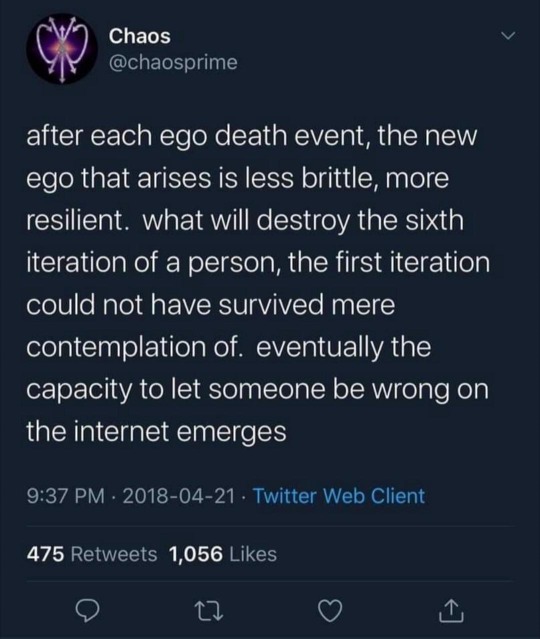
#literary analysis#honkai impact#hi3#phoebe rambles#the amount of people who decry the mere possibility of sushang not being a lesbian when she had a crush on a dude once#when they also ADAMANTLY refuse to acknowledge how queer coded the Seele’s are with one another#stop putting your moral agenda in my literary analysis what are you. 12
195 notes
·
View notes
Text
The SECOND Best Trope Ever Showdown: Round 2, Side C, Poll 3
Show Within A Show
A fictional work has another fictional work within it.
Propaganda:
HEAR ME OUT PEOPLE: "Show Within a Show" is usually the moment where I go batshit insane. Life imitates art, and art imitates life, and the show within a show is USUALLY where the author sticks in a very nice metaphor or symbol or another instance of a motif that from a literary analysis perspective is Awesome. Plot-wise, it can also be very fun. Think of anime protagonists putting on a play for their school festival! That counts! Think of Hamlet putting on "The Murder of Gonzago" to trigger his Uncle into basically confessing his guilt! Think of literally the entirety of Rosencrantz and Guildenstern are Dead! Show Within a Show is where you get to do some serious digging, some serious analysis, or you just get to watch performers performing performance. It also adds depth and new dimensions to characters that can just seem...tired. The "Itchy and Scratchy Show" and everything about Krusty the Klown from the Simpsons fits into this category. Krusty is a fucking MESS but you need the show within a show to explain why; otherwise, he's just a boring sad clown. Sometimes it's integral to the plot; sometimes it's just fun. It's a jack-of-all-trades kind of trope. Other examples of a Show Within a Show: The Goes Wrong Show, with its entire premise being that it is a show within a show. Pyramus and Thisbe from Midsummer Night's Dream. Singing in the Rain. Cabaret. Galaxy Quest. I Saw The TV Glow. I could name more examples, but I think I've proved my point.
Dark Is Not Evil
Dark colors, styles, themes, and powers being associated with good.
Propaganda:
Sometimes this trope means examining how those cast in traditionally “evil” roles are not inherently bad and, in more extreme cases, can use their abilities in creative ways to help others, thus doing away with harmful stereotypes regarding how appearance or circumstances of birth determine morality. Sometimes it’s just having your hero wear all black and wield a giant demon sword because it looks cool. You can’t go wrong either way.
24 notes
·
View notes
Text
I think a fundamental misunderstanding of morality is so prevalent in Star Wars discourse and I wish more people would think in complex nuance rather than 'this side is right and if you listen to a single thing the OTHER side says, then you're falling to evilness'.
I don't think Osha listening to Qimir's side of the story and understanding it is 'her seeing she's like this evil person, and so deciding she might as well be evil too!'.
I don't see Qimir as evil. I don't see the jedi as good. So where are we when we analyze character choices?
Fighting for freedom and choice is not inherently evil (see: The Rebel Alliance). You have to dig deeper than 'I don't like the Jedi code' when determining if that person rejecting a super high-control cult is doing so to harm others or simply seek freedom for themselves or the galaxy.
Is it possible to fight against the Jedi for evil reasons? Yeah (see: Palpatine). But that's not the ONLY option.
It feeds into this idea that once you 'identify' the 'good guys' in a situation, you need to back them uncritically and to listen at all to those you're 'identified' as the 'bad guys' means you're falling to corruption and evilness. That's just...a terrible way to 1) engage with media, and 2) engage with the world.
You could have been wrong when you identified the 'good guys'. But if you never listen to the things the 'other' side says, if you dehumanize them to the point where even when they're making valid points, you shut them down simply because 'well, you're the bad guy, so it's physically impossible for you to have any 'right' things to say at all', you stagnate as a person/group and corruption thrives in your ranks and the conflict between you and 'the bad guys' will never end. Not to mention, you miss out on a lot of good philosophy when we're talking about media analysis.
It's about actually looking at what people are saying and doing critically, with as little bias as possible, that will help you make your way to 'the truth' of the matter. If you've decided you're going to put on rose-colored glasses when you look at all the decisions made by 'the good guys' and piss-colored glasses for all actions taken by 'the bad guys', then you're going to miss the actual path forward.
Sometimes, NO ONE is 'the good guy' and sometimes, NO ONE is 'the evil guy'. What we CAN do is look at everything, the effects of their actions, their philosophies, and analyze it dispassionately to try to glean some lessons from it. After all, this is a fake world filled with fake people - acknowledging Qimir might have some valid criticisms of the Jedi order isn't putting a dictator in charge of your real-life country. This isn't a life or death situation here, so maybe take a breath and realize it's ok to sympathize and understand characters in fiction who might have done things we consider to be bad.
But it's also correct to say that the way we conceptualize morality in media CAN impact how we interact with our real world. That's why I think it's so important to expose people to the idea that there isn't a clear 'good side' and clear 'bad side' you can neatly separate all people into in a safe environment such as storytelling. You cannot separate real people into 'orcs' or 'hobbits' in the real world and I think a lot of people with their purity politics are forgetting that. Is it easier to dehumanize those who do things that harm others? Yeah. Is that good storytelling to make a clear and irredeemable enemy? It can be! But it's not the ONLY way to tell a story.
Seriously, look into some more 'lit fic' stories and you'll see that the common 'good vs evil' storytelling of fantasy/fantasy adjacent genres isn't the only way to write a compelling and meaningful story. Everyone can have good traits, everyone can have bad traits, and some traits can flip flop depending on the situation. Most importantly, identifying with the antagonist and certain traits they posses DOES NOT MAKE YOU A BAD PERSON!!!!
I guess the tl;dr of this is that it's ok to not be able to identify the 'good guys' or the 'bad guys' - it's ok to look at the characters and say 'boy, this is messy' and leave your moral judgement at that. There's no law that says you have to correctly identify the perfect people in fiction and if you get it wrong, you're punished somehow. Release yourself of that expectation and I think you'll find engaging with media a much more rewarding and eye-opening experience that can help you learn things about yourself and others that you can take into the real world in a non-combative manner.
Black vs White morality is not the only dynamic available in media and it's time we reminded ourselves of that, especially when looking at Star Wars.
#the acolyte#the acolyte spoilers#star wars#morality in media#meta#media analysis#so many people are reducing the interactions between osha and qimir as him trying to turn her evil and I think it's a disservice
43 notes
·
View notes
Note
What's your opinion on charles in wet. I've noticed that it's his weakest spot by now, but I'm quite new, and maybe it is not up to him, but some outside factors. Overall, I just want to know what you, as the princess of tumblr dot com races analysis, think about him on wet tracks because it most likely gonna rain in Canada.
Charles is actually a lot better in the wet than people usually give him credit for. Is he the best on the grid in the wet? No. There are several others who are much better(Lewis, Max, Fernando) However he does tend to get underestimated in the rain.
One of his best wet weather performances is Turkey 2021. The track is one of the lowest in terms of grip, so very slick already. Then it rained and he was overtaking, also set the fastest lap(at the time) in the rain, and finished P4. Like he wasn't just running in the rain he was putting out some very competitive racecraft in wet conditions. And he stayed ahead of Lewis even after the track was starting to dry(so inter conditions)
The reason he lost the podium place to Checo during that race was because Ferrari strategy decided to see how long he could go on old inters. So the loss of the place wasn't due to the weather.
Again in Monaco 2022(that race had other issues) he was leading the race, on the most technical track, with the most unforgiving margin for error, and was extremely competitive there(the reason he lost places that race was due to Ferrari double stack issue in the pits, you are seeing a pattern here . . .)
Regardless of the result, his racing under wet conditions there was extremely good. His pace and speed were on track to win there. And Monaco is one of the most difficult tracks in the rain.
There are others. But Overall I'd rank him in the top 5-7 drivers in the rain. He isn't as strong in the rain, and he certainly doesn't get stronger. But he is solid and has shown on multiple occasions that he is competitive in wet conditions both in speed and racecraft.
There are other things that work against drivers in the rain. This doesn't just apply to Charles. If a driver has a car that is really unstable in the rain there is only so much they can do.
A lot of lists and analysis just look at final results to determine if someone is "good" under X conditions, but you really have to look at the driving on track to get the real story. A driver coming in P5 who had insane skills in the wet, but then lost the places in the pits is an example where the end results wouldn't reflect the quality of driving.
Most drivers have mixed results in the rain. By results I mean finishing results and overall mistakes(big losses of traction etc) that's normal and doesn't mean any particular driver is bad in the rain. And I think another thing that comes up is his results have been mixed in the wet for other factors that were less to do with the rain and more to do with the car. Just about every driver on the grid has had a big spin or DNF due to rain. So I don't consider that a glaring sign of an issue unless it's happening very frequently.
In conclusion, Charles is solid and can be very competitive in the rain, but there are others on the grid who are better.
In Canada I expect a strong performance from him. The SF-24 is likely better suited for the wet compared to previous Ferraris. We will have to wait and see!
36 notes
·
View notes
Text
The best vaccine for propaganda is developing critical thinking skills. This is NOT flat out ignoring anything that goes against your opinion, or believing that anyone who holds a dissenting opinion from your own is a bot programmed to interfere with the election or an idiot. Frankly, even right-wing voters are not idiots. There are logical reasons that they vote the way they do, even if you do not agree with their logic.
I want to talk about the 2016 Russian Election Interference on Tumblr specifically:
In 2018, 84 blogs were deleted by Tumblr after a joint investigation between them and the Department of Justice determined they were linked to the IRA (Internet Research Agency) an organization indicted for running troll farms for the Russian Government. Here is the post made by Tumblr
Now I am going to ask you some questions:
What is the difference between a bot and a troll? Is that difference important to acknowledge?
Do we as users/citizens have a full understanding of why these blogs were determined to be connected to the IRA? Do we know the process the DOJ and Tumblr used to determine their link to the troll farm?
Supposedly many posed as Black Activists. But how do you decide who is a Blackfishing Russian troll and who is a genuine Black American? Were some of these blogs Russian trolls, and some that were deleted for reblogging from them actual Black people who genuinely agreed with their posts, regardless of its origins? What was the functional difference between their posts and the posts made by actual Black users about Black issues? Do you think a Russian agent is capable of effectively pretending to be a Black American? What about today: how do you know if the person with a dissenting opinion is a disgruntled US citizen or a troll? “But even if some of the information posted was false, It is impossible to know if that was done with malicious intent or by mistakenly re-sharing fake news.”
One post shown in this analysis includes a headline posted without a link; are you taking the time to investigate the claim a post is talking about? One post was reposted from an actual Black user on Twitter; How much of this ‘trolling’ were reposts from real Black users on other sites? What is the functional difference, especially if the original user is credited?
Do you think this strategy would be as easy to implement now that most sites know to watch out for it?
Do you understand why some people do not trust government investigative bodies to be fair towards Black activists?
How effective was this election interference on tumblr and elsewhere? Are there other reasons for a lack of votes from certain demographics related to the US electoral system itself?
When you talk about the Russian Election Interference are you approaching it in a way that frames everyone who has a dissenting opinion as a bad actor employed by the Russian government? Do you understand why this makes some people extremely uncomfortable? Do you understand why it can read as red scare-type propaganda?
What are Russia’s actual current political goals? How are Russian citizens different from their government?
How and when has the US committed its own psyops within itself and in foreign states? Are you just as wary of propaganda that originates within the United States?
Do people have the right to voice extreme opinions about their government?
Are you getting your information solely from tumblr? Do you believe others are? Why?
I don’t want you to reblog and answer (that would take forever). I just want you to consider what your own opinions and thoughts are on these subjects, to research where you lack knowledge, and to consider how you can approach people with dissenting opinions with sympathy when they are acting in good faith.
#jordan talks#us politics#ok this is like my last post abt this i am straight up just blacklisting everything
45 notes
·
View notes
Note
You will do a character/personality analysis of Shinomori, Banjo and En?
I already did some analyses of these guys, but I think I'm gonna put down this masterlist of what I can pull off the top of my head so far
In relation to posts I made, got asked about, or reblogs about the vestiges and analysis/reading comprehension, from what I can remember,
(Edit: this is a list I'm updating as time goes. Does not include the AFO posts I make [I also like that guy])
En being a product of the time he grew up in
En being cut in half by AFO and not OFA
This ask about if I think En has an anxiety disorder
En and Shinomori's vol 41 illustrations
Shinomori being cute and also some character stuff
Shinomori and Hood should've been the same person
Shinomori was a weirdo
Shinomori and Bruce can be related (appearance and similar character/habits)
This ask about Shinomori being Bruce's nephew
Banjo is a Vigilante, not a Pro Hero
Banjo is where AFO realized taking OFA needed more
Banjo word vomit from an ask asking if he wears a clown mask over his problems
Kudo's really kind
Kudo and Lady Nagant
(Extra point to Kudo-Nagant parallels- THEIR QUIRKS. When they used them, they shot bullets FROM THEIR ARMS and could make the bullet go WHERE THEY WANTED. Nagant by skill, Kudo by Ability)
Kudo, OFA, and "San-San-Kudo" symbolism
Kudo and Bakugo look alike
Kudo and Bakugo resemble each other in s7 too
Kudo and Bruce have eyebags
Kudo smiles like a muppet
Kudo makes funny expressions
Kudo is so short he tucks his pants in
The temptation to write about Kudo knowing nothing about babies and getting one thrown on him in the Resistance era + opening paragraphs
AFO hating Kudo while also being scared shitless
Me over a Kudo cameo
How Kudo fell when Yoichi died, and Kudo and Bruce's different reactions
The foreshadowing of why AFO can't hate strongly, with reference to Kudo
Just a mention in tags about what if Kudo was AFO's soulmate in a Soulmate AU
The Resistance were squatters
Me realizing Kudo's anti-AFO group is actually nameless
Bruce is hot but also has great character
This ask about Bruce's smile
The contrast between the only two times we see Bruce smile (as of ch 424)
Baby u r my angel (Bruce) + tags about being in Bruce's shoes
Some pics of Bruce at bad angles (+ he got the Ojiro treatment)
Me in the tags over Bruce fanart
Why Yoichi can be considered the older twin
Me in the tags when Yoichi shows up as a vestige in s7 ep 12
Some Yoichi-Midoriya parallels
AFO seeing Yoichi in Mineta of all people
Me mentioning people should consider Yoichi, AFO, and their mom in a red light district AU setting
3 reasons for why All Might couldn't find information on the first Three (Yoichi, Kudo, Bruce)
Me going buckwild over a Yoichi and Kudo gif and breaking tag containment
Yoichi + Kudo to Midoriya + Bakugo parallels in the [holding out a hand] scenes
Even as a vestige, Yoichi couldn't look AFO in the eye until Kudo was with Yoichi
The first Three's appearances in s7 ep 13
S7 ep 13 and Midoriya punches AFO with the power of rainbows, right after Yoichi and Kudo appear
*COUGH* Kudo Yoichi Bruce dynamic reblog *COUGH*
Me in the tags looking for rare content about the first Three
Me in the tags over the parallels of Orpheus and Eurydice, to Yoichi, AFO, and Kudo
Me asking if OC-centric fics exist, set in the times of vestiges
Chronological events based off AFO's chase of the past vestiges
Why OFA users are good bases for High-Ends
When the vestiges are smiling without any stressors. Just. Smiling. Oh my gosh-
A point in this post about how determination to beat AFO was what remained of the vestiges
Reblog of post that showed Bruce was crying when he fought AFO
Reblog of a post where Midoriya manages to kill 7 dead people (the vestiges)
Me in the tags wishing Ultra Analysis had pages of the other vestiges
Me in the tags about Horikoshi having detailed backstories for the vestiges and not giving them
My pinned post, which involves a masterlist for my BNHA OC fic stuff (all involve the vestiges, and set in their time periods)
#im not making posts about characters because others ask me to#i just wake up and go [KUDO IS A NICE GUY AND PPL SHOULD KNOW THAT TODAY]#i dont take requests. they make me avoid the character more actually#reasons were already posted in an ask about fic stuff but it boils down to#1. ppl ask for more stuff all the time and come off ungrateful 2. PPL DONT STOP STEALING MY STUFF#its been almost 10 years straight of that so nope. i dont take requests and im not gonna apologize for that#bnha#mha#ask#spoilers#masterlist#kinda#idk#hikage shinomori#en tayutai#yoichi shigaraki#kudo#bruce#banjo daigoro#nana shimura#izuku midoriya#ofa#one for all#boku no hero academia#my hero academia
40 notes
·
View notes
Text
Marxist Analysis 2: Moralism vs. Materialism
In what ways does Marxism analyze the world that Liberalism does not? What flaws are present in Liberal analysis that are subverted by a Marxist one? While once again, there are far too many differences to fully address in a single post, there is one primary difference which I want to get at with this one, that is, Moralism contrasted with Materialism. Liberal ideology classifies actions primarily based off theiry morality. They will see an action itself, and classify it as innately good or bad. The actual classification may differ between liberals, for example, some people will see something like political violence as innately good, while others will see it as innately bad. This distinction differs, but the underyling ideology, that of abstact moral classifications, does not. Everything fits into these strict classes of good, bad, acceptable, reprehensible, etc... Some things may be moved around at times, but the question of classifications themselves goes unaddressed This is contrasted with (dialectical) Materialism, which does not classifies things based off their innate or abstract moral character but judges them off the purpose they serve in the context they exist. What I mean by this is that a marxist will see political violence and not say, this is moral or immoral, we are not concerned with that. What we do see, is what purpose the violence serves. Is this violence defensive? is it a force progressing the proletariat cause? is it something that helps advance our goals in improving society? or is it a reactionary force, which serves the goals of the bourgeoisie? does it make peoples lives worse? This may sound the same as what liberalism does initially, but it is distinctly different. For another example, a liberal may say "okay well not all violence is bad you're correct, defensive violence is good, and offensive violence is bad" and you may think this sounds similar to what marxists do, but ultimately it is only creating another classification for which to put things in. It is breaking violence into two smaller actions, defensive action and offensive action, and putting each of them into boxes. On the contrary, Marxists understand defensive action can also be "bad", in that it can serve the bourgeoisie, and it can make the world worse. Is Israel defending their apartheid from Palestinian resistance good, simply because they're defending their country? No - of course not. Thats because this is not determined on the merit of which box defensive violence is placed into but rather the greater details and play and context of the action. Marxism holds that nothing can be understood when taken outside its context. We cannot make moral judgements on things in and of themselves, we can only judge specific instances and contexts. When first getting into Marxism this is one of the main roadblocks I encountered in my understanding. To judge whether or not something is worthy of supporting, you should not look at it and measure it to some abstract morality measure, via say, "how many flaws are present in this thing?" and then classifying it into good or bad based off such. Instead, you should look at something, inspect it, and decide if your support of this thing will improve the world, or make it worse. Will the actions you are able to take in support of something able to make the world better? Are you able to advance the proletarian cause? Conversely, is your disdain of something going to help counter the bourgeoisie? Is it going to help the proletariat succeed in their mission?
A strong example of this difference in method I can give is China. Many, many people, will see China and judge it based off their knowledge of how many wrongs occur in the country, decide if it is a good or bad country, or some mix inbetween, and then from there hold it in high regard or distaste. Marxists however, understand that our personal regard for their issues is not the important aspect for support. The important aspect to consider before giving our support, is what will our support or condemnation do? Can I meaningfully support this country in a way which will improve the world? Can I meaningfully oppose it in a way that will do the same? Generally speaking, flaws of China aside, there are very few if any ways for imperial core "leftists" to oppose China which will improve the world. The actions you can take against China will never make the world better. Sanctions will only make the people suffer more. Deriding "the government not the people" still demonstrably leads to anti-asian hate crimes. On the contrary, supporting the people in China and their endeavors can reduce sinophobia, we can pressure our governments to stop swarming them in military bases and economic pressures. This will demonstrably improve not only their lives, but likely the lives of the global proletariat in general. Of course not all Marxists agree with this analysis of China, it is a point of contention even within communist circles, but the important aspect to remember is the method of analysis, the way which you go about determining whether or not to give something support. It is not based off mental classifications, measuring things up to "morality", but rather based off our ability to effect the world, and whether or not our support or opposition for something will make the world a better place.
Contrary to metaphysics, dialectics does not regard nature as an accidental agglomeration of things, of phenomena, unconnected with, isolated from, and independent of, each other, but as a connected and integral whole, in which things, phenomena are organically connected with, dependent on, and determined by, each other. The dialectical method therefore holds that no phenomenon in nature can be understood if taken by itself, isolated from surrounding phenomena, inasmuch as any phenomenon in any realm of nature may become meaningless to us if it is not considered in connection with the surrounding conditions, but divorced from them; and that, vice versa, any phenomenon can be understood and explained if considered in its inseparable connection with surrounding phenomena, as one conditioned by surrounding phenomena.
— Joseph V. Stalin, Dialectical and Historical Materialism
#marxism#long#self post#this one is a little longer but if i try to make it more concise ill never finish so im gonna publish#feel free to offer corrections
15 notes
·
View notes
Text
RWBY Volume 9 "Epilogue" Thoughts
youtube
So, here it comes an extra volume 9 animatic "epilogue" and I wanted to share some thoughts and a brief analysis.
General Thoughts
I really really liked it!
I am happy the Atlas refugees are having problems to adapt and that the Schnee Family has to face their privilege head on
It not being included in volume 9 works better for me because its contents can easily be re-arranged at the beginning of volume 10. In my opinion the story flows better this way (only my 2 cents though)
I am neutral to Raven's appearance.
On the one hand I hope the conflict between her and Yang is not solved too easily (I also think Yang hiding the Spring Maiden identity should be addressed). On the other hand her appearing at the beginning of the new story arc solves several things. She can make progress early on, so that the focus can then be given to other characters. Moreover, she can reveal what happened between her and Summer. If this mystery is solved, then there is more time to focus on Summer's return (either as a Grimm, a human or in some kind of symbolic way). In short, it can all lead to very thight writing, so I approve.
As for people wondering if the story was changed since RWBYJ leave the Ever After on their own... we can't say, but personally I never felt Raven saving them from the Ever After really worked thematically and I don't think it is what the epilogue implies. After all, before the video they say they deleted some scenes which tie with volume 10 plot. I think RWBYJ's meeting with Raven is one of these. Nonetheless, I am happy if we get our "Spring leading to Summer" symbolism. (Which really works on multiple levels doesn't it?)
In any case, I think Raven simply senses Yang is back and goes to meet her. Then she leads them all to Qrow. This in itself is a significant improvement for her. Still, it makes sense if Raven thought Yang was really dead. It can work as a final callout and a consequence of her actions. Yang outright asks Raven to choose between herself and her daughter and Raven makes the selfish choice. As a result, Yang dies. It is no surprise then that Yang coming back is seen by Raven as a final chance to do the right thing.
Speaking of people dealing with grief and loss, here we come to the heart of the new content and the focus of this short analysis.
Winter and Qrow - Grief
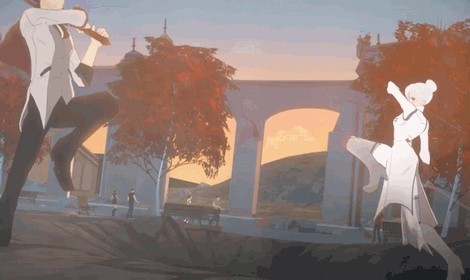
So, the heart of the video is really the foiling between Winter and Qrow. This is interesting in itself because these 2 characters are tied together since their first appearance in volume 3:
Qrow is Ruby's mentor
Winter is Weiss's mentor
Both girls look up to them and try to imitate them. Still, this changes with time as both Ruby and Weiss grow until they are able to inspire Qrow and Winter back.
Here, we see exactly this, as both Winter and Qrow talk to the two girls in their minds (Qrow is talking to all of them, but the foiling is between Weiss and Ruby and thematically the focus is on Ruby anyway). Still, their thoughts are complete opposites.
On the one hand Winter focuses only on the problems and sees no beauty at all.
Winter: "But no amount of determination or hard work will change where we find ourselves now. What do you do when there is no hope left?"
On the other hand Qrow is conscious things are bad, but is full of hope.
Qrow: Call me crazy, but I am actually feeling a little optimistic about things. I figure... Don't get me wrong...It's bad. In fact it'd never been worse. And yet, you can still see the goodness in all things. Acts of kindness, people trying to atone for past wrongs.
This ties to their 2 different ways of mourning.
Winter: "You and your friends did all you could to save the world. You would be so disappointed in us. Maybe it's for the best you don't have to see this Weiss" > She is looking at the memorial monument, where it's written "Don't come back"
Qrow: "Things may be bad, but my biggest regret is that none of you are here to see the good that you started because you did start something." > He cries while looking at a picture of Ruby that says "Remember her message"
Winter thinks it is best that Weiss isn't there to see that everything was useless. Qrow instead wishes the kids were there to see that the world is changing. These behaviours aren't limited to Winter and Qrow's feelings over the protagonists, but they fit their reaction to another important loss they both faced:
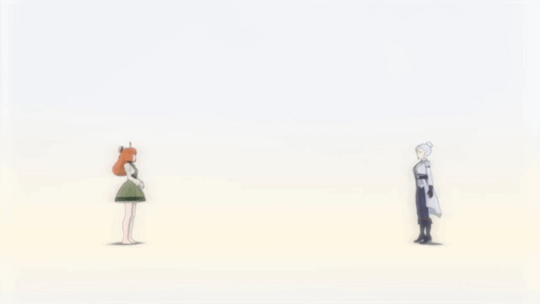
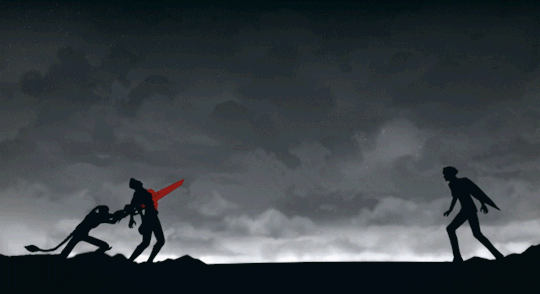
Penny and Clover's deaths have similar roles in Winter and Qrow's stories, as they are supposed to integrate with their lost loved ones. This is conveyed also through their respective powers:
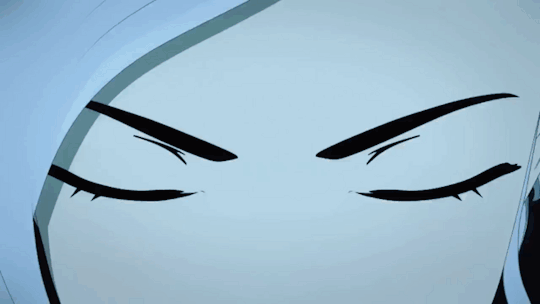
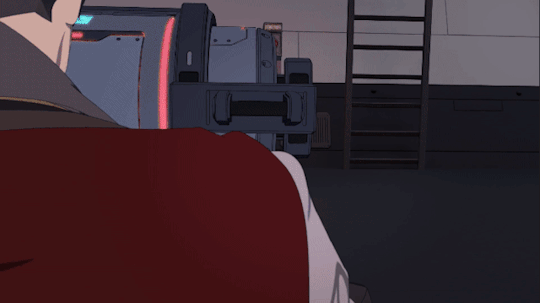
Winter inherits the Winter Maiden's power by Penny and Qrow's semblance evolves to become similar to Clover's. This shows Qrow has successfully integrated Clover's mentality into his own:
Qrow: Like an oasis in a desert, it's all a matter of perspective. You see, an old friend taught me that.
The same can't be said about Winter:
Penny: "I won't be gone, I'll be part of you."
Winter: "Because of me, Penny is gone. Forever."
As Penny herself states in her final goodbye, she isn't really "gone", as her legacy lives up in Winter. This means Winter should honor her will and adopt Penny's optimistic mindset. Still, Winter is doing the opposite. This is why she feels Penny is really gone forever.
In other words, Winter has understood rationally what a real Maiden should be like:
Winter: No, Penny. You were always the real Maiden at heart.
However, she still doesn't feel it in her heart. This is why probably she needs Weiss to finish her arc:
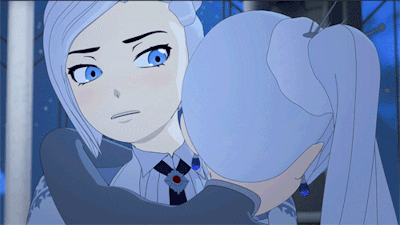
After all, Weiss is supposed to be Winter's second Gerda, which takes out the final cursed glass fragment from Winter's heart.
Qrow is instead close to the end of his arc, in my opinion. As a matter of fact he has already been inspired by Ruby:
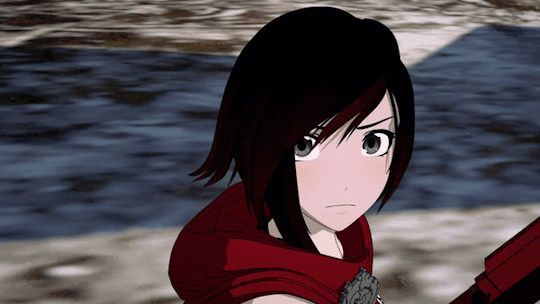
I think he only needs a top off, which will probably come with a final showdown with Tyrian, which will not be about revenge, but rather to save someone (probably Mercury).
What's important is that these 2 characters explore the theme of grief in opposite ways.
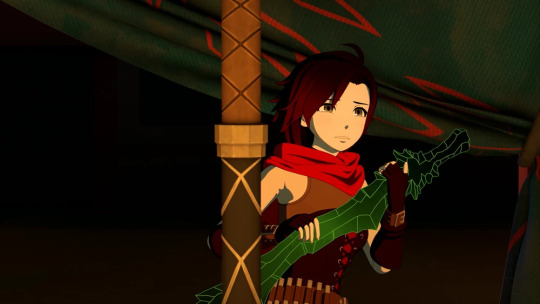
Ruby: I… I thought this was lost forever. How’d you have it? Blacksmith: Nothing. No one is ever truly lost.
Qrow understands the meaning of the Blacksmith's words, whereas Winter doesn't. The Blacksmith conveys to Ruby that all the people she lost are still parts of her. This is why she keeps finding Penny's sword over and over. It is because the hope Ruby saw in Penny is really just a part of Ruby herself:
Jinxy: Enough hope to fill this jar.
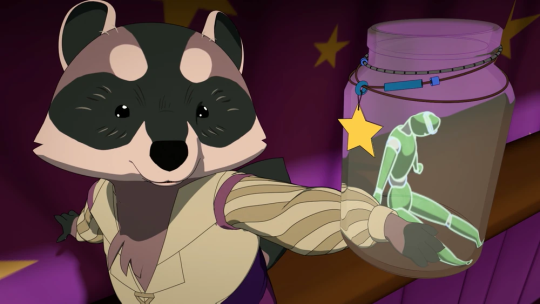
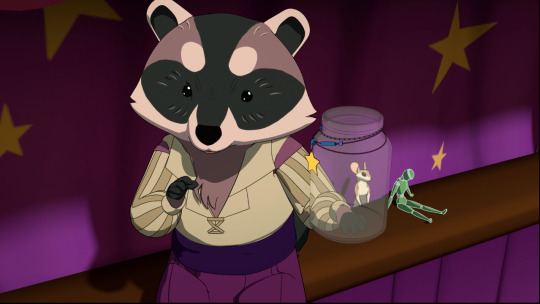
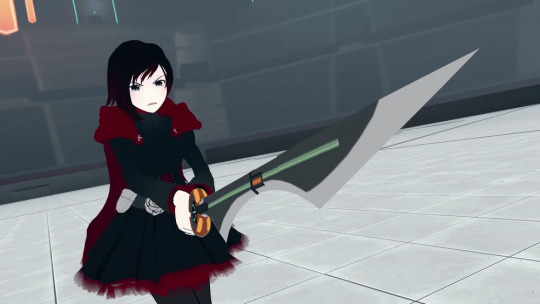
Ruby fights a Nevermore (grief) by using Penny's sword (hope).
Similarly, Qrow's sense of belonging and his wish to do good don't go away with Clover's death. If anything they are parts of Qrow that Clover made emerge. Thanks to the Lucky Fisherman, Qrow has now the right framework to show them to the world.
Winter too has in herself the heart to be a Maiden like Penny. She too has one of Penny's swords inside. She is just not looking at it out of self-hate and guilt. Luckily she is now surrounded by people who love her and they will hopefully help her take a closer look at the mirror.
#rwby#rwby volume 9#winter schnee#qrow branwen#ruby rose#weiss schnee#raven branwen#greenlightvolume10#rwby meta
140 notes
·
View notes
Note
I don't know if my continued Rhys Efflorese babble gotten eaten so here it is again. (if I'm repeating myself I'm very very sorry)
Rhysand being so certain that Cassian and Azriel's Illyrian honor and loyalty will keep them on his side without having even a shred of awareness about what Illyrian honor even MEANS much less what it might mean if they feel that HE'S the one who betrayed them first. I'm not sure that Rhysand even has any concept of Illyrians beyond the asshole camp lords that Night put in charge. (Why were they freezing in the mud, huh, Rhys?! WHO PUT THEM THERE?! Why might they not be will to share their whole selves with the Prince of Night, huh Rhys?)
It says a lot about how much faith and respect they had for Shahar (I can't remember how to spell her name right now) that even though she didn't live among them as one of them, they still very much considered her theirs and believed she could (and would) make the future better for them. (This is a thought I had while reading Starlight: the House of the Wind is possessed by the ghost of Rhysand's sister and she's fucking Pissed at him)
Rhysand is very bad a cost-benefit analysis. Particularly because he doesn't seem to have any concept of what a 'cost' actually is, especially when it's someone else who'll be paying it. Or even what a benefit is really. (Dude, you have two business savvy, policially knowledgeable, intelligent humans who are personally invested in keeping Feyre safe. This would be a FANTASTIC opportunity to learn about the state of the human lands and kingdoms and formulate plans based on new information instead of, you know, deciding you already had a perfect plan despite the fact that you haven't talked to a single (not Feyre) human in at least 500 years.(*insert the "no it's the children who are wrong" Simpsons guy meme here*) Or that maybe there's this guy right here with friendly acquaintances all over the place that could be very useful if you weren't, you know, a shithead. But nope, slightly bruised pride too much cost)
Rhysand's desperation for Feyre to only see him in a very specific light is greatly aided by Feyre's equal determination to only see him in that exact light.
Rhysand thinking that, even after learning he fucked off to the continent and got arrested for gambling debts, bringing shit-head papa Archeron into the situation will keep ANYONE in line (kinda love that even though we're all, like, Everyone Gets a Name but then none of us will can shithead papa Archeron anything but shithead papa Archeron)
Rhysand hoping this situation that he doesn't want to deal with implodes while not comprehending that it will implode into A WHOLE NOTHER SITUATION
Do you think he's a bit baffled when Feyre comes to the conclusion that her sisters hate faeries? Like he's perfectly pleased with the situation and happy to roll with it because it'll drive a further wedge between her and her sisters do you think he looks at the perfectly polite chats with Cass and Az despite the glowing siphons and giant bat wings (plus the Shadows in Az's case) and the House Full of Blood Magic/ Lucien FUCKING Venserra situation and think "Whelp, I guess you've got an immortal lifetime to learn some observation skills" (not that she'll learn good observations skills from HIM anytime soon)
Rhysand thinking that Feyre loves and cares about these people and that therefore they are a THREAT to HIM instead of that meaning that he should maybe he should care about, or, a least, try to get along with them.
Elain just keeps smiling a playing the perfect hostess is nearly as infuriating as Nesta snarling in his face. Then she puts Cassian's knife to his throat. That's probably one of them most WTF moments of his life. (someone please tell the Illyrians that Elain held a knife to Rhysand's throat. They deserve knowledge that this tiny human girl was willing to pull a knife on a High Lord for her people (a people they are now part of))
Did he notice that Elain served him some funny tasting tea and just think nothing of it because human food is all shit to him? (Also Cassian had almost zero reaction to Nesta saying that Elain had tried to poison Rhysand, his High Lord/'brother')
(in your Nesta/Eris story, the Valkyrie priestess says something along the lines of "Rhian's sniveling brat son may think the world revolves around him but it doesn't" and "Shahar would be disappointed in him." These statements feel applicable this Rhysand (or all Rhysands really))
Rhysand is about to get a crash course in how loyalty is a two-way street. The Archerons' people (now including a bunch of awestruck Illyrians) are so ride-or-die for them because the Archerons are just as ride-or-die back.
All three of the Bat Boys are in the process of completely loosing their shit in different directions.
Side-note: When Elain offers Cassian tea and calls him sir and Cassian's like "WTF I'm not a sir" and Elain's like "It's a courtesy given to any man with a title" and Cassian's just "naw I don't have a title" and then in her head Elain's like "WTF in what world is General not a title?" It just makes me wonder about Cassian's (and by extension, Azriel's) actual place in the Night Court's (barely existent) court hierarchy.
Side-note the second: While mentioning the Night Court's barely existent government system the thought of Amren having secret peons in place helping keep the court running. It might have started as a bit of a game 'How much functioning government can I make before Rhysand actually notices" however I think it got boring pretty quick through a combination of, 'he barely ever notices anything not shoved directly under his nose' and mild concern that Rhysand might actually notice and stop her and the court will implode even faster than it already is (and she's gotten stupidly attached to some of these colorful insects and would like to keep them around a bit longer) (Side-side note: I'm SO hyped for Amren to meet the rest of the Archerons)
Side-note the third: if there's Archeron ships in Night then there's probably Archeron ships in Summer too right? That could spin the whole Summer-book theft debacle in... interesting ways. (I'm imagining Tarquin talking to Feyre about Archeron ships bringing in supplies to rebuild the city at greatly reduced transpiration fees or something and Feyre's just mentally like "wtf my sisters hate faeries why would they do that" (because she's still operating under that particular delusion) but (because Rhys thinks it's a good idea) she plays along like she knows about it or something and uses it to gain more of Tarquin's trust before, you know, Rhys's whole *brilliant* plan takes place. Imagine how abso-fucking-lutly pissed OFF, Nesta, Elain and Lucien would be. Like, the whole situation would already piss them all off but add in deliberately taking advantage their family's reputation and kindness to do it? Rhysand had better stay well out of stabbing distance. (Side-side-note: Tarquin's, like, less than one hundred right? The dude spent more than HALF is fucking life Under the Mountain. Give him a fucking BREAK.) (Side-side-side-note: Just popped into my head. What if there were babies BORN down there. Like, that's their whole life down there. I just realized that this isn't actually much of a what-if scenario because really we just have to look under Rhysand's OWN fucking mountain to see how that goes.)
I think that's all of the babble for the moment. <3
Oooo so much good stuff here! I'll try to go in order 💜
Rhys is canonically shitty about Illyria and the Illyrians! I almost feel like I'm hitting the bottom of the barrel to give it emotional nuance- Effloresce Rhys has wrapped together all his grief and ego into just. Complete bullshit. Nesta sees this immediately! ( Cassian and Az have. Had to live within this, which I'll get to)
But yeah, that's the center for him in so many ways: he has to The Most Right, Fully in Control, Always in Charge and also does not take responsibility for shit. Ever.
So he belittles it. A warrior culture? Savages. Mor blatantly using Cassian when they were young? Oh that drives Cassian crazy. Azriel is wildly fucked up? No, it's the fault of his childhood not his continued life! Cassian gets close to his literal soulmate? Are you fucking around with Feyre's sister, Cas?
One of my character things for Rhys is that he wants Everything just barely more than he wants nothing. He is SO voraciously is the center of his own world while being so utterly careless with that world. So there is no balance. There's just what Rhys wants.
And he wants Feyre so Feyre is also always right. And just. Canonically does not seem to value her sisters as people so much as auxiliary manifestations of her own self.
They're like her irksome pets Rhys has to deal with.
Cassian's actual rank is going to come back, but I would say that you could easily call Rhysands perspective on the Archeron alliance making 'huh, the dogs AREN'T smart enough to be afraid of bears, and I, a person, find this quaint'
(Elain is going to kill the fuck out of someone over this.)
Poison doesn't matter because Cassian chose a side basically the second he crossed the wall. Even without Nesta. (You could possibly say he has always had a side, and it has always been Nesta.) Further, Lucien absolutely clocked that blood! All these things add together, really.
As for Amren, she's less focused on a functioning government as she is invested in a broad outcome. She keeps her vows. She is, perhaps, playing an elaborate game of wondering what Rhys does and does not know.
Oooo Summer is a stop on the Elucien honeymoon diplomatic carpet bomb, actually. They're not actively trading there, but they're not unknown. Rhys is definitely still hunting the book to use Feyre's Super Specialness.
Tarquin is young and progressive! I know the books utilize this to be like 'oh, he'll give Rhys a chance', without ever clarifying if Tarquin or anyone knows the actual degree of Rhysands willing or unwilling cooperation with Amarantha. It doesn't make a ton of sense. I like to take it in another direction.
#an excellent ramble!#we're clarifying on the Illyrians points in the worst ways soon#kind of funny when I think about it that the books act like Rhys is ever good at strategies#commiting atrocities to spare yourself personal pain is. not that#And! he believes his own hype! all the time!#the crux of Feyre is the more things go wrong#the more she listens to Rhys#(or herself)#stress just heightens the hero complex bullshit#meanwhile Nesta: worked so hard to stay safe in a place that is no longer safe. no reason not to full throttle#not to mention Elain#or Lucien with Ya Know all those friends and allies and POWER waiting to be unleashed#human rules all out
20 notes
·
View notes